#excepting the buffoonish part
Text
"Witches have an opinion of wizards that we are devious, buffoonish, and paranoid"
For sure proving them wrong there, Steel
#worlds beyond number#wbn#wbn spoilers#wwwo#wwwo spoilers#excepting the buffoonish part#but you can't just say that then do something devious and paranoid
35 notes
·
View notes
Text
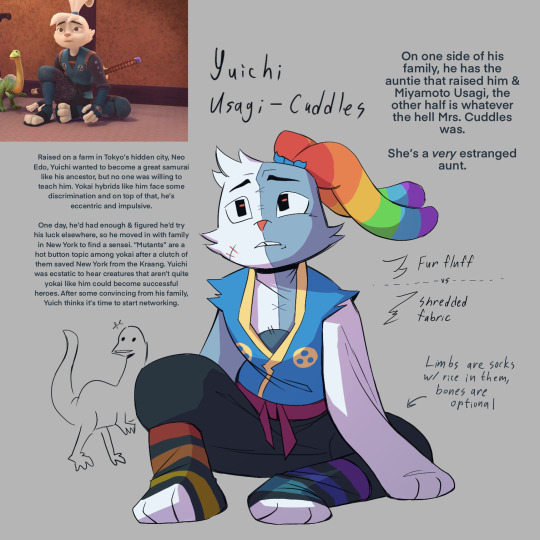
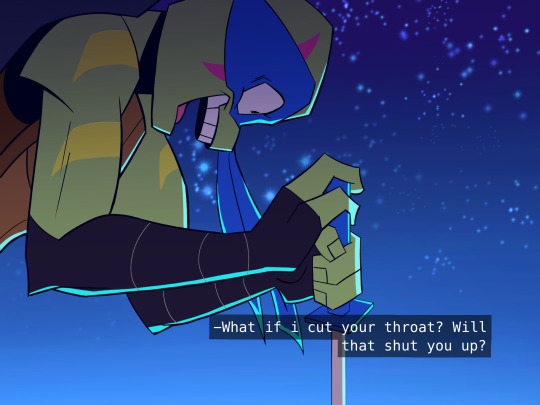
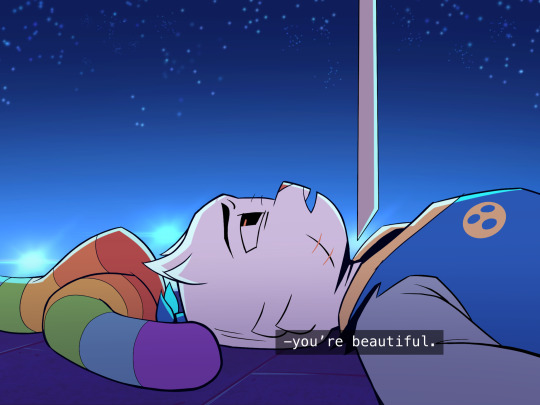
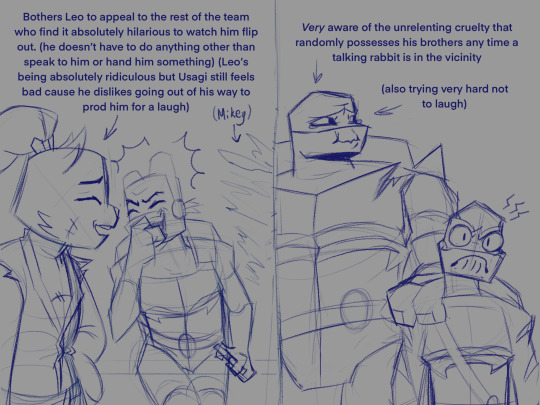
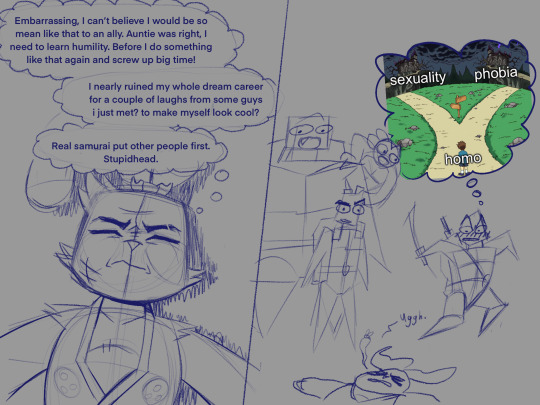
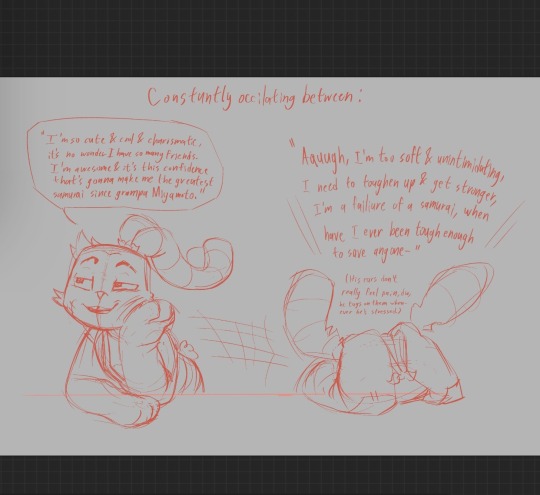
Introducing; Yuichi Usagi-Cuddles!
There’s a slight typo in his basic character bio, (first, grey image) other than “yuich,” his family in America lives in the part of the hidden city under Jersey. He lives in Jersey. He’s a Jersian. So in terms of leosagi, it’s gonna be an enemies-to-lovers comedy-of-errors muahahahaha!!
More (a LOT more) info about him as his own guy under the cutoff :D ⬇️
Basically; He’s a silly guy! I feel like his kinda buffoonish, embarrassing personality in canon is simultaneously PERFECT for Rise’s writing style & grievously underrated in fanon depictions. So he’s this clownish type of character, haha.
Okay, time to go hyperfixation mode.
Adhd & his stubborn attitude;
He has ADHD! Executive function issues makes it hard for him to start tasks & manage himself, so he relies on his teams (the Mad Dogs when he’s training & the Rise equivalent to his canon friend group on his own time) to not only instruct him, but also hold him accountable & keep him on task. He’s body-doubling without even realizing it.
Although, he resents the things he does to accommodate his disability. He doesn’t notice that doing the things he does genuinely helps or why so he thinks he’s using them as a crutch because of incompetence. Every time he gets stubborn and ignores the things he needs to do, he crashes and burns. When he was new in town with no teacher & no friends who liked martial arts, he became a huge sad sack until the kraang invasion.
His character arc is about being able to rely on other people & accommodations. That relying on a bit more help than other people doesn’t make you incompetent, choosing to seek out the support you need so you can do your best is the true mature thing to do. I was inspired by canon Yuichi’s struggles with paying attention and Rise’s themes of cooperation. (& also my own experience with adhd and learning with executive function issues & junk)
Relationships w/ the turtles;
The Mad Dogs agree to let him like, intern with them? So he can see what it’s like to be a vigilante, they offer him advice and they occasionally go on low to mid-tier missions with his help. They take him on cause they think more heroes and allies out there, the less work they have to do haha. Also, one of the writers mentioned a season 3 would have them adjusting to being ~official heroes,~ I think this would be them trying to be “real.”
He’s closest friends with Mikey out of the whole group! (Adhd solidarity) Then it goes Donnie -> Raph -> and finally Leo (for now muahaha)
I tried to give Leosagi an interesting dynamic with constructing his character like this; They have similar insecurities from drawing self-worth from technical capabilities that they can develop past together, but Leo is clever and calculating about it vs Yuichi being rash and impulsive. So like smart x stupid but they’re the same actually.
His Family in Jersey;
He speaks english fluently because he’s visited his American family frequently his whole life, they’re very close. He has an accent though since he mainly speaks Japanese.
I haven’t fleshed out this concept enough, but I think members of his jersey/Cuddles half of the family would be spoofs of characters from the original yojimbo comics, implied to be reincarnations? Except Miyamoto ofc. (i’ll explain later..)
Reusing the ninja orphans plotline from the original show, his family utilizes their cute appearances to run an orphanage too. They wonder why this Chizu lady is constantly showing up with unhoused children, but they’re just grateful they’re safe now.
Everyone in his family HATES Mrs. Cuddles, they all think she’s in prison and are happy about it. She might’ve given him that scratch on his face.
Additional;
He is gay.
Thank you for your time.
#rise of the teenage mutant ninja turtles#rise of the tmnt#artists on tumblr#rottmnt#leosagi#leoichi#tmnt#tmnt fanart#adhd#adhd character#rottmnt usagi#tmnt leonardo#rottmnt leo#gonetoforks’ art
237 notes
·
View notes
Text
So, as much as I love charming, swaggering Han Solo, the guy is kind of awkward.
At first I thought it was an issue with his characterization in ROTJ where they made him a little too buffoonish for lack of a better word, and in Solo where they leaned a little bit too hard into Han being inexperienced and naive.
Don’t get me wrong, when it matters, the man is suave and dangerous and charismatic, and I love it.
But I was rewatching ANH the other day and I realized that at least when it comes to his personal relationships (except for Chewie) Han is kind of insecure and inept at forming meaningful relationships. To be fair, it makes sense given his backstory (in both Legends and Canon) and seedy profession. But legendary scoundrel Han is not at all slick when it comes to genuine interaction.
His initial introduction in the cantina as a ruthless survivor and his cocky dealings with Jabba tend to be the bulk of what people remember about his character, and for good reason. But there’s also captivating glimpses into a Han Solo who is more human than he probably wants anyone to see.
When Ben trains Luke, Han won’t stop insulting them both, but underneath all of the posturing, he does genuinely try to offer up real advice (that a good blaster is more reliable than an antiquated weapon). Then later, before abandoning Yavin, he doesn’t want to part on bad terms with Luke so, he chokes out a parting phrase that means something to Luke, tamping down his discomfort which is visible to the point that it’s kind of funny.
The first movie largely neglects his lack of social skills in regards to Leia (they do snap at each other, but that’s more to do with their clashing personalities than anything). He winks at her at the end, but Han is good at surface level flirting.
But then we get to Empire…strap in folks.
So, their first interaction takes place in the command center on Hoth, and Han is threatened to leave. And boy oh boy does Han really want/need Leia (and Leia in particular) to say she wants/needs him.
She has her own (very understandable) issues with opening up, so the closest she can get to admitting her own feelings is saying that the Alliance needs him. Leia may see herself as an extension of the Alliance, but that’s a different conversation and not enough for Han who needs to be sure of her feelings before making his own known. (Leia seems to have the same problem. They kinda suck at communicating sometimes.)
He asks her, very subtly pleads with her to open up, to reciprocate the bit of vulnerability he’s showing. She understandably doesn’t (again she has an unfathomable amount of her own trauma), cueing a fight at and Han goes back to the Falcon to be Totally-Not-Sad. Despite the fight though, he risks his life to make sure Leia gets out during the evacuation. (Gotta love how well he knows her.)
Then we get the big kiss scene. This time, Han has decided to acknowledge Leia’s insecurities because he wants to be with her. He specifically asks her “What are you afraid of?” Yeah, he’s kind of teasing her, but he knows Leia freakin Organa is not afraid of getting her hands dirty. It’s such a lame excuse, so he calls her out on it.
Then, all of the sudden, they’re finally together and Leia is just all in (see my post about Leia’s physically affectionate nature). And…Han adjusts. By the time they arrive on Bespin, he’s the one initiating hand holding, giving forehead kisses.
It’s a way more intimate than he would afford a casual hook-up. His scrapped intro in ANH (which was incorporated into the novelization by Alexandra Bracken), literally had him forget the name of the girl on his lap.
He’s still insecure when Lando starts flirting, but above all he’s in a relationship that is so casually affectionate. It’s a part of him we’ve never seen, but it suits him well.
Then we get to the big “I love you/ I know”.
In the original script, Han was supposed to say “I love you too.” Everyone thought it was a very out of character thing for him to say. The now iconic response was created during the shooting of that scene. I agree…to a point.
Now, I love the line. It’s iconic and great and very Han Solo. Yes it’s a smooth response…but it’s also…a really weird response…
Yeah, there’s a lot of people and to be fair, he just told Chewie to take care of Leia (which is very sweet), and once again probably still has some issues expressing vulnerability.
But…he also might die, so it’s weird that he wouldn’t tell her while he still can.
The pattern continues in ROTJ. Han is a bit out of character in this one, however I do like the moment where he’s referred to as a general. It’s usually read as him proving his commitment, and I agree. But I still think it’s funny that he decided to make it a surprise. It’s so cute and weird and very Han Solo.
He’s protective when Leia goes missing after the bike chase, and when they’re reunited picks her up and spins her adorably.
He’s still not super sure how to provide comfort all of the time (there’s a few times where Leia seeks his embrace, and he seems visibly unsure of what he’s doing). During the battle he’s always reaching out to shield her, hide her when she’s injured. Then he just holds her after the battle. The way she asked him to earlier, with a small but very genuine smile.
Finally, we arrive at “The Princess and the Scoundrel” where Han Solo does the GFFA equivalent of proposing on the first date. (For real, this book is one my favorite things. It canonized so many of my head canons like a very casual proposal). It’s perfect for its balance of being both weird and romantic.
Anyway, I like Han’s soft side and I don’t see it discussed enough.
416 notes
·
View notes
Text
Leverage Log: The Rashomen Job
Rashomen episode! Always a cool thing to see
Love the use of different actors in the pre-reveal stories... Need to look up the actor who plays the Head of Security guy.
should note that Nate's version of the story is also subtly wrong, (resentment towards Sophie's compliments to the guard-guy making him paint the guy as more incompetent then he probably was. The roses and crush were definitely real but no way he was as buffoonish as he's portraying.)
Liked the little detail with Parker's POV, where what Hardison describes as him just enjoying the party, she frames the same way she psycho-analyzed Luka in The Stork Job. (Foster-kid/orphan, hoarding food).
love the champagne shrimp-switch, and the bickering over Sophie's accent.
basically, its a good rashomen episode.
----------------
as an aside, i was having dinner with the family after watching the Rashomen Job and got to talking about the show and I had a realization.
My Leverage Log is terrible.
I've only ever done one live log watching a series before, and it was easy. (I was catching up with the seasons of RWBY i missed). I had no problem making episode by episode, scene-by-scene analysis. Posting one log per episode broken down into parts.
but I'm failing to make this log for leverage.
and I realized how much of a compliment that was.
When i was catching up with RWBY's seasons they were cliffhanger-laden as hell almost every episode ending on a cliffhanger or twist in an attempt to bait further engagement for the shitshow that series was. But at no point did i even hesitate to stop and write out my responses to everything despite the constant attempts to Scheherazade me, at no point did i feel even an inclination to demand the story continue where it stopped.
meanwhile Leverage, with exception to finales, is an episodic series of purely stand-alone episodes! And not only have I found myself unable to stop in episodes to write things down. I've been forcefully compelled not to take the time between episodes to write reactions either.
Without any cliffhangers, just off the consistent baseline quality and chemistry of the cast, they've made it impossible for me to do this watch log properly.
I consider that a positive review. All the engagement of a Thousand and one Nights, without any of the cliffhangers.
2 notes
·
View notes
Text
The extremely disturbing and slow rise of magic portrayal in entertainment media.
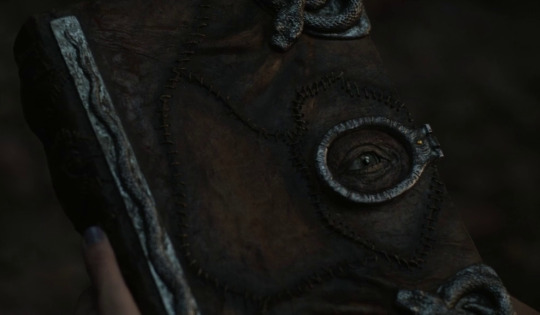

It’s like cyanide for people, coated with chocolate and candy.
When people think of actual magic or Satanism, it’s more likely that they’re thinking of skulls surrounded by pentagrams or stars drawn with blood and candles and sorcerers chanting strange or unknown languages to do something extremely evil like summoning a demon or getting someone killed, etc.
You don’t need to go that far in fantasy to know that all that evil has come so close to you, face to face but you haven’t known it still. It’s been a very slow and subtle development in entertainment industry that hasn’t been noticed by many except a few who hold knowledge and the ones who are religious.
The slow injections started in the 1980s with the Scooby-Doo franchise, although this cartoon show started more than a decade earlier but something odd started developing in the later years which is introduction of actual demons or monsters in the kids’ show. That meant they were moving on to using obscure means of defense against the said evils they confront. But the bottom line has always been to make kids and even adults interested with flashy bright and vibrant animations to get more curious and make it seem more familiar with the show.
Then viewers were presented with a movie called Hocus Pocus in 1993, plus a sequel released recently as this October of 2022. It involves witches trying to steal children to suck their souls to be eternally young. The first one is “quite fun” according to Hollywood’s point of view, but when I got to the 2nd part recently I did feel the targeted changes there, with LGBT. The stark contrast was that the first film never had much of screen time involving any religious or occult themes, just a jolly film (for most of the viewers). But the second one was in a way, bashing religion. The town’s priest is shown as someone brutal and somewhat buffoonish. In a later scene, 3 young girls feel overjoyed when they receive a book of sorcery by a witch, that they use till adulthood and become witches themselves. And there is a strange angle of the film which tries to convince the watcher to empathize those witches as they die because they were too young to know any better when using the book as kids. These movies, like others I’m pointing at also have the right knack of using very catchy music which makes viewers feel more loose and casual and not knowing the grotesque evil shoved in their faces, like cyanide covered with sweet irresistible candy.
On the other hand, we have millions of cinema goers which absolutely adore Superhero movies which have gotten quite occult slowly over time.
But one of the most shocking movie I watched was a Disney animated movie called Encanto. I don’t need to describe everything in that movie, but I guarantee you this, that it’s absolutely chock-full of absolute blatant, outright Satanism without any masking but filled with catchy songs, vibrant and innocent sceneries which can indoctrinate kids and viewers into thinking: Magic is something good and normal.
Magic isn’t just pixie and fairy dust or sparkles in cartoons and movies, it’s a slow shift in watchers’ conception that it’s something beautiful and not a dark, horrid thing.
In the end, I would explain to you what an “Overton window” is. Put simply, it is a very slow shift in stages to any society or people or a person in a way that the said people wouldn’t know that a gradual shift is even happening. Once an Overton window is successful in changing a society by very slow means, a person from the same society would be absolutely different from what he/she was about 10-15 years ago.
May we never fall into such Satanic traps, Āmeen!
#islam#muslim#spirituality#allahﷻ#allah#patience#islamic#islamic post#islamic reminders#islamic quotes
15 notes
·
View notes
Text
Why Legend of Korra Breaks Avatar's Worldbuilding
Part 3: Politics

The last in my three-part rant about Legend of Korra. This one is the most excuseable because who really wants to put complex international relations into a kid's show, right?
(Look, I was one of the kids who enjoyed the trade dispute arc in Star Wars, sue me)
Avatar's worldbuidling as applies to politics is... pretty simple. There are basically only two "nationstates" as we'd understand them, in TLA, and a handful of "nations" who are not states, as well as some local and indepedent territories.
LoK expands that to three nationstates but gets a bit muddy about the rest.

"Anarchy Bad"
This is more a generic look at the way the series treats politics. It makes it look complex on the surface but it's really very shallow. Again, kids' show, fine.
Season 1 and Season 3's antagonists are both anarchists of a sort. Amon is, on the surface (before he's revealed as a fraud), a sort of socialist who decries the (actual, displayed) inequality shown towards people who can't bend elements. He's the bad guy, of course, because this is an American TV show so we can't have any of that.
Season 3's Zaheer is explicitly an anarchist of the very stereotypical "no gods, no masters" type. Unfortunately there's a lot of mixed messaging going on, because the writers go out of their way to show three nations with incompetent leaders (the Republic City President, who only cares about ratings; the Earth Queen, who exploits her people as property; and more subtly Suyin Beifong in the semi-independent city of Zaofu who is shown to be a bit out of touch with the common folk and running a bit of a dystopia.
Despite these examples, Amon and Zaheer are still definitely shown to be "wrong"... even when their core grievances are upheld as legitimate. The writers don't really seem to know what to do there.
How is this related to the worldbuilding, you ask? Because it shows there isn't much, under the surface. The Earth Queen is assassinated and Ba Sing Se is explicitly stated to fall into utter chaos immediately. Apparently the Dai Li can't do jack shit. The greater Earth Kingdom is also stated to be in a bad state, which could be chalked up to generations of mismanagement from the kingdom's government and warfare with the Fire Nation, but this isn't really discussed or displayed either except for mention of "bandits" in Season 4. Instead we're fed this idea that although the Earth Queen is objectively a bad ruler, without her in place everything falls apart. Don't eat the rich, kids, just... I dunno, go blog about it.
Obviously this isn't how things work IRL. Yes, we have the narrative idea that once you overthrow a dictator things go to shit (see: any war in the last forty years), but this is an overly simplistic look at things. Infrastructure and statehood are complex, messy things that don't flip like a binary switch.
In 'reality', Ba Sing Se may have been a bit loopy for a few days but the Earth Queen's successor would have taken over, the Dai Li would have kept order (like they had been for a century already), and most of the kindgom's bureaucracy would keep ticking over without issue.

Prince Wu
A bit of a basebreaker character, Prince Wu of Season 4 is the Earth Queen's nephew and designated heir to the throne (selected and supported by the Republic City President, the Fire Lord, and Tenzin... which shouldn't be how that works, either, and smacks of other political corruption). He's shown at first to be a whining, pampered, buffoonish dandy but grows over the season to become more connected with the people to the point where he indicates he wants to dissolve the monarch entirely and replace with a federal democracy.
So... wait, last season overthrowing the monarchy was bad and led to complete chaos, followed by three years of a military dictatorship, and now it's all good actually don't worry about it. Again with the mixed messages; also the implication that the people of the Earth Kingom can't do anything unless the God-King allows it, as if they're simple peasant morons who need careful shepherding and guidance.
All in all, it leaves the worldbuilding feeling very insubstantial and empty.

The World Leaders
On that note, it seems that every major decision is delegated to a council of five people: The Fire Lord, the Republic City President, Master Tenzin representing the Air Nomads, the Earth Monarch, and Korra's Dad.
In Season 1, Republic City was more complicated and run by a council that had a representative from each bending nation and a token non-bender. We see in the comics/novels that Aang and Zuko set this up to resolve the issue of Fire Nation colonies in Earth Kingdom territory, and it's overall a pretty okay way of doing things. Very early democratic experiments, I guess.
It gets replaced with a singular President later because... Honestly I don't really remember, but it smacks of "this is too nuanced, make it simpler".
These five people - of whom only one is an elected representative, it's worth adding - meet a few times in Seasons 3 and 4 and are hinted to form a sort of "united nations" analogue. After the Earth Queen's assassination, they seem to be the ones who 'decide' on Prince Wu as her successor... rather than, you know, her government? Or the pre-established line of succession?
It's not really surprising that Kuvira decides to go do her own thing.

How Does the Earth Kingdom Work, Anyway?
Firstly it should be noted that, looking at the world map, it's implied the Earth Kingdom is the size of Eurasia. It doesn't take a lot of knowledge about history to know that this isn't very realistic and is generally considered a big "no-no" in worldbuilding.
From what we can glean from the show, it seems to be a sort of feudal monarchy, with the Earth Monarch ruling from Ba Sing Se (as a city-state) and accepting the vassalage of the rulers of other states - Season 4 shows us briefly the 'Great State of Yi', as well as Zaofu, which is nominally part of the Kingdom but seems to do whatever the hell it likes. Suyin said she "purchased the land" - from who? The King, I guess? Never really cleared up.
From TLA, we know that Avatar Kyoshi previously protected a peninsula - later Kyoshi Island - from becoming part of such a kingdom, so we can infer from this that there are fully autonomus and independent groups around. The Great Desert and the Sandbenders seem to bow to no one's authority, and the Swampbenders are the same.
So really, it looks like the Earth Kingdom is more like a very loose grouping of states who all pay nominal lip-service to Ba Sing Se. This definitely shouldn't lead to the "full anarchy" that supported Kuvira's rise to power.
So... maybe that's actually an in-universe lie, or Republic City scaremongering. Certainly it looks like Kuvira just spent three years going around each of the states in turn and subduing them into her Empire, but apart from the one display of bandits attacking Yi, we have no knowledge of how well or badly the others were faring.

The "Air Nation"
Just as a side note, I love that Tenzin gets an equal seat on this whole world leader council thing when his entire 'nation' is about thirty airbenders and a couple of hundred fanboys.
The Water Tribes
Finally I just want to highlight that in TLA, there are two water tribes - one at the north pole, one at the south, which makes sense because they're literally a world apart from eachother. in LoK we see them "reunited" and Korra's Dad is in charge, but like... There's still the geographical distance, dudes. It's not easy to run a nation as one thing when both halves are separated by the entire planet.
Anyway... That's probably enough of all that. Thank you for coming to my TED Talk.
6 notes
·
View notes
Text

Comparing Apples and ?? Crab-Apples??
The Guard (2011) // I Care A Lot (2021) // Wuthering Heights (1847)...
***spoilers***
CW: Oh my goodness so much bad behaviour across all of these, but specifically - The Guard: murder, cancer, death, suicide, drugs, drug-smuggling, discussion of torture, prostitution, and strong language // I Care A Lot: murder, exploitation of vulnerable people, violence, threats, violence against women, violence generally, mafia // Wuthering Heights: terrible, terrible people, coercive control, unhealthy relationships, various kinds of cruelty, and more death.
TLDR: I guess people have different tolerances for different kinds of poor behaviour in the fiction/art we consume and, um, should feel the freedom to choose what we do/don't consume accordingly.

Well, I *have* heard of fiction and - YET - my personal experience with WH was that I hate-read Wuthering Heights as a mid-teenager in one immense, skim-reading session because my mother had bought it for me as a present and told me that I would love it and I kept stubbornly hanging on for the part where that would be true.
(I have subsequently accepted that M and I have wildly divergent tastes and the best indication that either one of us will violently dislike a thing is when the other one turns out to really like it.)
Fair point that perhaps we're in a context where many of us are Not Great and Getting Less Great at being able to differentiate between character and actor or character and author. Quite possible that someone would enjoy WH and still have the common sense to cut ties with anyone IRL who behaved in the same register as Heathcliff.
I can see the value of art forms that include or even focus on unlikeable characters. Totally willing to believe there are people who love these forms of creative expression and seek them out.
BUT
For me - it's not that I *can't* spend time with the character Heathcliff, it's that I don't WANT to. My time is precious. I don't feel like torturing myself. There's more to read than I'll ever get to and I just DON'T feel bad about letting myself off suffering through particular pieces of cultural capital that don't appeal to me.
Which brings me to The Guard vs I Care A Lot.
I Care A Lot was facing a bit of an uphill battle because I'd been manoeuvred into watching it and in these circumstances, I'm both cowardly (so, will fold) and vindictive (so will resent the movie and the movie-chooser and will probably sulk and be Not All That Much Fun).
BUT
I super very much disliked the opening sequence of ICAL yes yes sets up her character - cold, dislikeable, competent, ruthless, motivated yes yes we are supposed to take against her (and perhaps also admire her at least a little?) yes yes cool twist on the gender wars
EXCEPT
Really? The hyper-competent boss-girl lawyer is also - sharp intake of breath - EVIL. And - Lesbian. Hot competent lesbians are evil.
**sigh**
Conversely, I found the opening sequence of The Guard intriguing and funny, whilst also at and beyond the edge of taste and decency. Okay - drink driving. Okay - youth death. Okay - tampering with evidence. (But did you know notice that at least the stated motive was to spare the feelings of the bereaved mother? Admittedly delivered in a way that makes it v hard to know whether it's sincere.)
Do I repeatedly forgive The Guard because the MC is cis-het middle aged white male or because this buffoonish, never-by-the-book cop takes care of his mother, seems to have a moral compass (buried or skewed by all the other stuff), and ultimately rises to the occasion?
I found him likeable. I enjoyed being an observer of his world. I even found that he did terribly dislikeable things is mostly a likeable way.
In ICAL, I finally started rooting for the female lead around the time she was facing down the mafia boss and expressing calm unconcern at the threat of execution. Here, she also rose to the occasion IMO.
BUT she was terribly dislikeable (not in itself a reason to avoid the movie though probably a reason *I* should have avoided it) and I was overall pleased that her deeds eventually caught up with her.

Read a couple of lowish quality reviews while I was "working through my feelings" about this movie. One of them said interesting things but in a style that suggested AI involvement (maybe, maybe not... I don't think any use of AI was declared - oof, this just makes me sentimental for the good old bad old days of the early internet).The other one was a scarcely veiled excuse for pushing hair products.
In the hair article, I thought there might be something small and specific about the decision to give RP a ramrod straight 'do' when she's in court and a more relaxed version of the bob otherwise. Nope. There was, however, a comment that the design team was trying to use hair design mirroring to reinforce the idea that RP and PD were essentially the same (something about a tiny pigtail?). This I found intriguing and credible. I *do* think the mirrored characterisation is an important idea in the movie - and makes sense of the decision to use an ordinary guy to bring her story to a close, not the gangster.
Feels like a "wrong answers only" response but we walked through the Inns of Court area of London this am and I wondered briefly if there was a "look like a wig" vibe going on with RP's hair in the courtroom scenes but honestly, nope. Don't think that's why. I think it's just about making her look especially extra: controlled, cold, in control, sleek, shark-like, on her game, court-credible, etc.
PS Himself and I had a chat about why wigs were incorporated into the UK judicial costume and I'm smugly delighted to note that my guess (that when the dress was codified it was just Normal Everyday Wear for Gentlemen) was there or thereabouts as the reason.

PS2 final thought, from sport not from art -
At the Paris Olympics, I was moved by this moment in the Decathlon, where one Norwegian competitor, having just crashed out of the medals on the pole vault, competed in the final event anyway to act as a pacer for his teammate who then successfully won the gold.
As the caption says, under certain formulations of the rules - perhaps under certain ethical framings also - it's possible to argue that Rooth shouldn't have had access to this kind of help, that it was an artificial enhancement of his chances. And yet - I found it noble and moving. Sheesh, the way we don't all perceive things the same way, eh?
[Tweet by Gabby Pieraccini, 4th Aug - the rule being discussed was the "Gundersen" approach - no, I don't otherwise know what that is.]

0 notes
Note
Speaking of Pulp Heroes and their rather more fraught relationship with the authorities than their 4-Color successors when I read the first couple Secret Agent "X" stories, it felt like he has a buffoonish cop nemesis solely because the writer felt the genre's tropes required him to have a buffoonish cop nemesis. So. Why do so many Pulp Heroes feel a need to have a cartoon caricature of Inspector Javert in their cast?
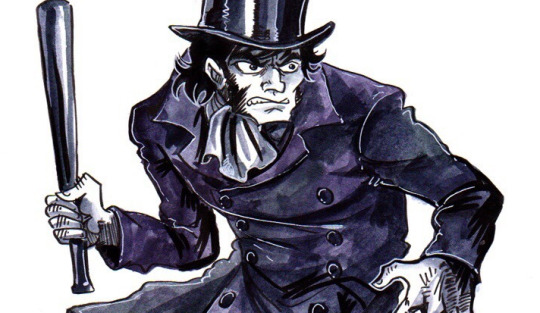
(Inspector Javert art by dasha-ko)
The simplest answer is that much of it can be chalked up to the importance pop culture osmosis plays in how we construct stories, especially when we're explicitly trying to reference existing tradition or building off an established mold. So much of superhero fiction's origins are built off the American pulp stock and trade, and so much of that in turn is owed to the British and French pulp fiction. And when people look at the history of detective/crime fiction history and it's origins, and the role of characters like Arsene Lupin's Ganimard, Fantomas' Juve, Jacques Closeau, Harvey Bullock, Zenigata and so on, they quite reasonably assume that, much like how tight circus costumes are grandfathered into the superhero concept, it's assumed that every Gentleman Thief protagonist needs a Ungentlemanly Cop arch-nemesis / annoyance, because that's just how the concept works. The longer answer means that we gotta talk about Inspector Javert specifically, and why he ended up becoming such an imitated touchstone for pulp fiction.
The fact that so many of them take up after Javert specifically is interesting in itself, because it's not just a result to Javert being one of the most popular mainstream examples of "bad cop" characters and thus the go-to example when you want your cops and detectives to be, at a minimum, dumb obtrusive goons who can have a change of heart and, at worst, one-note villains who usually still aren't quite bad to overshadow the more interesting villains and piss off real cops who are a million times worse than what you can usually show in fiction get in trouble with audiences for disrespecting authority. In some ways, they miss the point of Javert, but also expand on the point Victor Hugo was making with him and the novel as a whole, which was in some ways a response to what the serialized fiction tradition was like at the time, as part of Hugo's intended aim of advocating for social reform:
So long as there shall exist, by reason of law and custom, a social condemnation, which, in the face of civilization, artificially creates hells on earth, and complicates a destiny that is divine, with human fatality; so long as the three problems of the age—the degradation of man by poverty, the ruin of woman by starvation, and the dwarfing of childhood by physical and spiritual night—are not solved; so long as, in certain regions, social asphyxia shall be possible; in other words, and from a yet more extended point of view, so long as ignorance and misery remain on earth, books like this cannot be useless
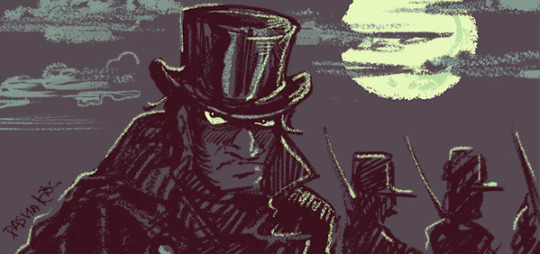
A lot of people miss the fact that Javert did not exist in a vacuum. He wasn't just designed to be a criticism of law enforcement and a rotten cop or whatever, he was explicitly based on Inspector Eugéne Vidocq. Claims about his real life achievements are countless and self-aggrandizing and none of them matter here except for one fact: His memoirs published in 1829 are said to be the bedrock where this entire concept of "detective fiction" started, at least in the anglo-sphere (although his effect loomed globally). Vidocq was not only the inspiration for Javert (as well as Valjean), but he was also the inspiration for Rodolphe de Gerolstein in The Mysteries of Paris, Monsieur Lecoq who would go on to inspire Holmes, and long before that he inspired Edgar Allan Poe's C.Auguste Dupin, who was an unflattering take on Vidocq, and is considered the first fictional detective.
Detective fiction existed some ways before Poe's Dupin via magazines and newspapers, as the concept of the "private detective" started taking form circa the turn of the 19th century and, as all new things tend to develop, fiction started to develop about them, largely thanks to the memoirs and autobiographies of officers like Vidocq, to the point that by the 1830s, virtually all detective fiction was about private detectives. I'm linking this thread on the Pinkertons that Jess Nevins wrote on Twitter here, in case more of you wanna dive deep into where this grody copaganda business took it's baby steps to sink it’s teeth into fiction to never let go, but the point being: For about half a century, the whole concept of the Great Detective, the central figure of detective fiction and of much of popular fiction as a whole, was based on Inspector Vidocq, and that was what Victor Hugo was responding to when he made Javert. He was based on The Super Cop, the Cop of the Century for that era, and here's another dirty secret that even most Les Mis adaptations get wrong about Javert: He IS a Super Cop. In-universe, he's the best damn cop in the whole world.

He is without vices, but upon occasion will take a pinch of snuff. His life is one of privations, isolation, self-denial, and chastity—never any amusement
He would have arrested his own father if he escaped from prison and turned in his own mother for breaking parole. And he would have done it with that sort of interior satisfaction that springs from virtue.
He is every bit the incorruptible paragon of order and devotion that people tend to attribute to characters like Jim Gordon. He’s honest to a fault to a point he insists that, if he were to be dishonest, he should not only be resigned, but also punished, should he commit any injustice on others. Other cops in the story dislike and distrust him specifically because he’s not corrupt. He’s as unrelentingly hard on himself as he is to everyone else, and it literally kills him the second he’s forced to grow a seed of conscience towards those he spent his entire life oppressing. He is, by basically every metric, a Good Cop, an unusually good cop at that, and he is a bad, rotten person, because that’s what it takes to be a good cop. He isn’t bad because he’s “one rotten apple”, he isn’t bad because he’s just too obsessed with one particular man, he is bad specifically because he’s a good cop, and he is very good at serving a terrible system, and he is very good at enduring and enforcing it’s cruelties, and the moment he is forced to question to it, when he’s no longer a “good cop”, he kills himself because that’s his way of resigning from life.
He had lost his bearings in this unexpected presence; he did not know what to do with this superior (convict); he who was not ignorant that the subordinate is bound always to yield, that he ought neither to disobey, nor to blame, nor to discuss, and that, in the presence of this superior who astonishes him too much, the inferior has no resource but resignation. But how to manage to send in his resignation to God? - Victor Hugo
It was a very damning perspective that Hugo was putting forth with this character, not just as a criticism of law enforcement, but also as an open dialogue with pretty much the entirety of the feuilleton traditions that informed the century, of the uncorruptible, inscrutable, unfailingly correct detectives stomping on wicked criminals, a condemnation somehow more timeless in 1863 than countless other takes on the story across the couple of centuries since that downplayed what exactly Hugo was getting at and why Javert was that way. Javert was a response to almost 50 years worth of how the entire concept of detective fiction worked and was seemingly supposed to work forever. So, obviously when it was time for others to twist the concept further and start focusing on the daring thieves and arch-criminals for a change, well, if these characters are supposed to stand against the law at it’s mightiest and get away with it, and you don’t quite feel like buggering Conan Doyle again, what other archetype are you gonna invoke as the allmighty, yet failed, representative of the power of The Law?

(Pictured: Inspector Zenigata, Inspector Lunge fan-art by admhire, Hank Schrader)
The Javert / Inspector has become an ubiquitous staple not just of fiction that stars gentleman thieves that, even when they are not specifically modeled after Javert, they often hit on many of the same notes that made Javert so enduring and potent of a character. It’s kind of almost a necessity, if you’re writing a story that focuses on a criminal, to see what does the law enforcement he opposes on some level looks like, and it makes for some pretty varied and interesting characters, often with some of the most interesting dynamics these stories have to offer.
Sometimes you get characters who actually do need to be serious and heroic, if only because of the sheer scale or menace of what they’re up against, and because they don’t get to win, they can be played for tragedy, characters like Inspector Juve or Hank Schrader, who is interesting as he is very much not a Javert-kind of character at first and probably never would have come close to being one, if he didn’t find himself thrust into the position of Heisenberg’s arch-nemesis and thus had to try and make himself into the extraordinary pursuer of justice, to disastrous consequences. Zenigata’s one of a kind as, somehow both a Super Cop as well as the absolute worst cop alive and only one by the thinnest thread possible (which is part of why he’s ultimately sympathetic, because his morals usually come first and he will team up with Lupin to solve bigger problems), a more deranged nutjob than the entire gang of master thieves he keeps up with. He stretches the broad strokes of the Javert archetype to such an extreme while still remaining ultimately a moral character that he winds up becoming as much of a cop as Mario is a plumber, and an indispensable part of the gag while still being very much not just a gag character.
Lunge’s on a totally opposite end of a similar scale, in that he’s a direct response to Javert as well as Holmes, demonstrating what an unflinching obsessive devotion to the law as well as a restless genial crime-solving brain does to someone who is not afforded a protagonist safety net or that sheen of fantasy most fiction affords these characters: it basically leads him to torpedo his life of everything that doesn’t get him to capture the criminal he mistakenly pursues, and it doesn’t bring him any step closer to stopping the real mastermind either, and it’s not until he owns up to his mistakes and starts to understand the story he’s in that he starts to actually help.
You can play these characters up as seriously, or as comedically, as you’d like. Sometimes they are overzealous clowns who never stood a chance and exist to make our protagonist and other villains seem cooler by comparison, and sometimes they make for such hilariously “bad” cops that they actually end up being pretty decent and even potential allies (like Chase Devineaux from Carmen Sandiego). Often, they can be a concentrated amalgam of the writer’s own feelings towards law enforcement and policing and carceral systems and whatnot, which often makes them complicated in ways even the authors don’t quite intend them to be.
A massive part of why we enjoy these kinds of stories comes in the form of transgressive fantasies where people can trick or escape or overpower or even take over and change the systems that routinely make life so difficult for us. So much of detective fiction stars police protagonists because they place readers in the shoes of getting to be the ones with the power of the jackboots for a change, but copaganda is not synonymous with detective fiction, and hasn’t been for well over a hundred years, much of it for so long has reveled in characters who are not police or police-adjacent. These characters often stand, in turn, as many things that you might need a cop in the story for, almost like a concentrated focal point.
Maybe you want to explore the ramifications of law enforcement in your fantasy world, maybe you do believe that cops can still be salvageable and you want to show what a “good one” would look like in your view, maybe you can’t think of them as anything other than distractions at best and chief enforcers of all wrong with the world at worst, or maybe you just put em in there so you can go “Oh, what would the cops do about my hero? They would hate them because they’re too cool and they would suck at stopping them, end of story, let’s move on to more interesting stuff”.
They aren’t always the most interesting characters, especially when they are just 1-to-1 Javert clones who remain neutral or mistake the point of Javert for simple-minded obsession, but they are always very telling characters, and they are not just a crucial archetype for what makes this kind of fiction work, but also a very significant touchstone of it’s inception and how far it’s come, and often, just fun to have around to make idiots of themselves, when fiction lets us get away with that. Fiction lets us get away with softening the edges of a lot of things we need outlets to confront safely (what else lets us do that?), this being one of them. Even when they suck, and they’re pretty much made to suck most of the time, I’m glad this archetype stuck around.
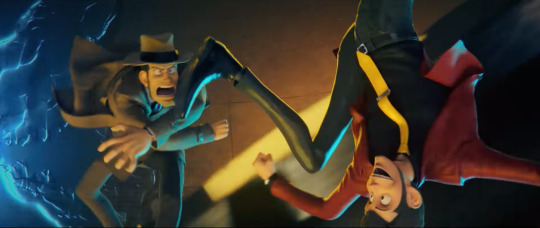
#replies tag#pulp fiction#pulp magazines#les mis#les miserables#javert#Lupin III#lupin the third#zenigata#arsene lupin#lupin#detective fiction
94 notes
·
View notes
Note
jafar
First impression - I was obsessed with him as a kid. I actually funnily enough saw The Return of Jafar before I saw Aladdin, and that was my Jafar movie until I finally got to see the original Aladdin. Jafar was everything I loved about Maleficent and Grimhilde, except he was a man, and so he was a character who I could pretend to be and love without earning any side eye from adults at the time. I dressed up as him and pretended to be him ALL the time.
Impression now - Still my second favorite villain after Maleficent, and still one of the most important fictional characters to me and my life. I absolutely love him, and he's half of my pet ship OTP that I'm obsessed with today, Captain Serpent.
Favorite moment - There's so many to choose from, but when he becomes the World's Most Powerful Sorcerer and starts throwing magic around left and right, singing "Prince Ali (Reprise)", and just throwing his victory and theatricality in everyone's faces - that whole part of the film is my favorite and it's so exciting and triumphant for me.
Idea for a story - I write for Jafar a lot in my Overtaker fanfic series, and I talked about the Hook in place of Iago story idea in my Hook post. It's hard to think of more that I haven't done. Though actually, his backstory really fascinates me. I've touched on it before through dialogue, but I'd be very interested in exploring his childhood with his sister Nasira, how they discovered the temple of the sand witches to first learn magic, and how he was sent away to boarding school to become refined and grow into the regal man he is today. There's a lot of potential there.
Unpopular opinion - I think a lot of fanworks either make him too ineffectual and buffoonish or they make him just a complete cold sociopath with no ties to anyone. And I don't really agree with either interpretation. He's more so in the middle by my estimate: he's treacherous and conniving and pure evil, but he's also not beyond having friendships with other villains. He's not cold intellect; he's impulsive and greedy and has big grand emotions. Let him have feelings, dammit, even if they are very evil ones XD
Favorite relationship - Him with Hook from OUAT in terms of romance, him with the other Overtakers in terms of platonic relationships, and though I'm glad that Iago redeemed himself, I think Iago and Jafar had a really fun and entertaining partnership in canon.
Favorite headcanon - He killed Jasmine's mother. Hypnotized her into throwing herself from the guard tower, making it look like a suicide. She was catching onto his schemes to overthrow the Sultan, and Jafar also wanted her out of the way to get a monopoly on the Sultan's ear, securing his place of influence and power.
9 notes
·
View notes
Text
Top 5 007 Films
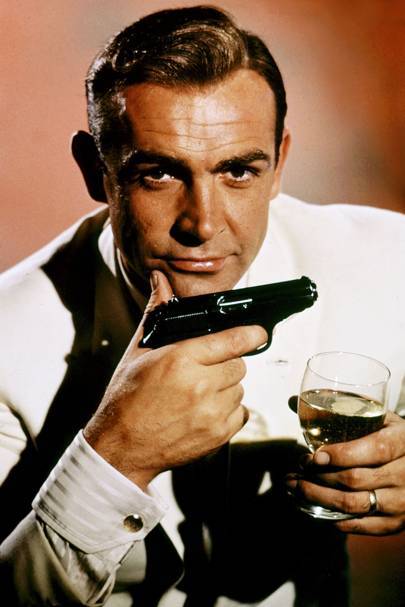
Click through for the definitive guide to the crème de la crop of the greatest spy-thriller saga in all of film history!
#1. North By Northwest (1959)- A staggering achievement for every artist and performer involved. Directed by peak middle-period Hitchcock, and written by Ernest Lehmen, this production stands as a defining role for both Carey Grant and Eva Marie Saint alike. Released only 6 years after the inception of agent 007 (still a creature of spy-thriller novels at this point, another 4 years out from the silver-screen debut), Grant’s performance would leave an indelible mark on the collective unconscious and would surely go on to influence the likes of Connery’s own portrayal years later.
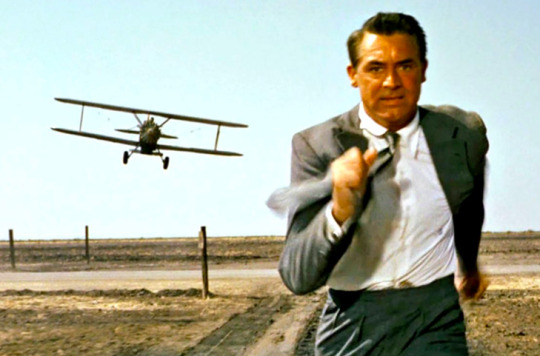
Case-and-point for why Grant excels here is his undeniably amorphous quality. Sure he’d proven his sheer on-screen magnetism for decades by this point, but the dynamic quality of his “character arc”--as the kids like to call it-- in this film speaks for itself. He goes effortlessly from buffoonish in the introductory and more comical part of the movie, to suave and inter-personally-entangled in the middle third, to finally making good on all the romancing and endangerment that the character is thrust into by the final frame.
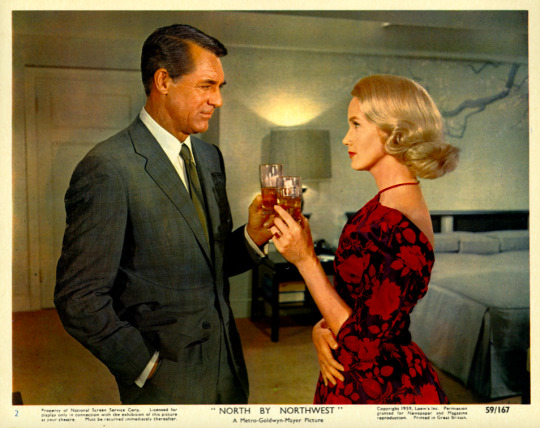
Meanwhile Eva Marie Saint undergoes multiple transformations herself-- a feat pulled off by both her deft acting and the writing/directing alike. She sets a precedent for Bond fatales that isn’t fulfilled for years and years by Bond’s own franchise in that she maintains complexity-- and more importantly agency-- until the last.
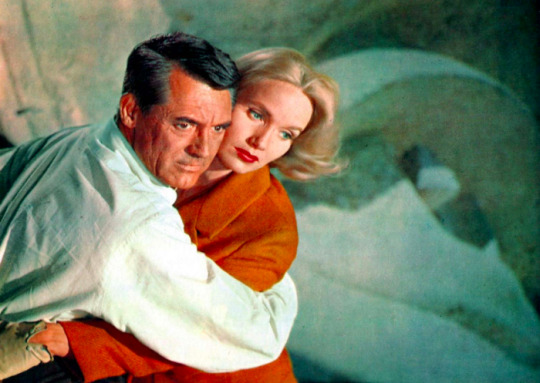
Lastly, Hitchcock himself with Lehmen’s script is able to craft a narrative with visual thrust which balances humor, tension and pacing better than most of his very finest productions. The well-loved cropduster chase-scene is a masterclass in tension and directorial pyrotechnics, and all the heartbreak and salacious revelations that unfold from that moment onward seal the deal for this film as pure unmatched brilliance.
#2 Charade (1963)- A year after Connery’s debut as Bond, a lighter thriller shows a possible alternate-universe for the franchise; one in which Carey Grant maintains his stranglehold on the archetype in lieu of the mad Scotsmen himself.

Director Stanley Donen and writer Peter Stone, clearly taking some inspiration from Hitchcock’s work with Grant, tease out one of the actor's greatest performances in the process, and similarly to North By Northwest, it has equal-parts to do with Grant’s acting as it does the air-tight screenplay and the myriad twists and turns found within.
If North By Northwest starts from a hijinks-ridden tone and works its way towards spy-thriller seriousness, Charade stays madcap and light-hearted throughout its runtime, while only hinting at the tension and stakes that one would come to be accustomed to glimpsing in a proper 007 endeavor.

The fantastic chemistry between Audrey Hepburn and Grant throughout maintains an emotional center around which a whole satellite of criminal and comic figures can orbit in perfect narrative symmetry.
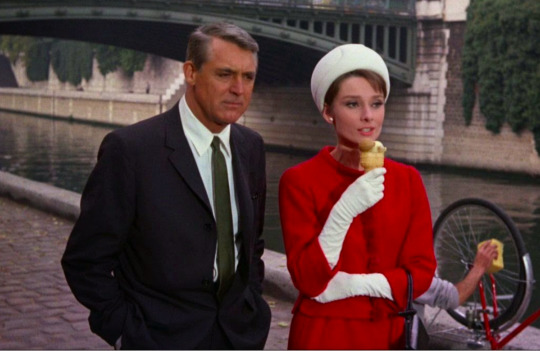
The suspension of clarity when it comes to the nature of Grant’s character might be the ideal pocket from which this renowned thespian operates from, keeping both the audience and Hepburn’s character guessing until the final moments of the runtime. And as the mystery unfolds, Donen is sure to center Paris itself as the immaculate stage from which all of this cinematic pleasure plays out.
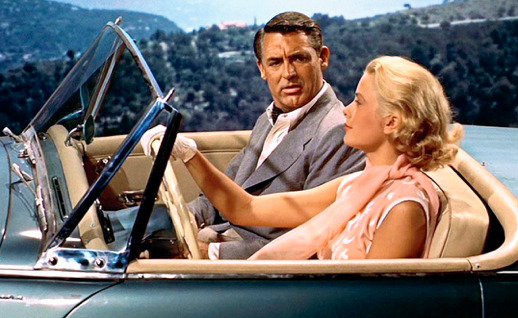
#3- To Catch a Thief (1955)- This film may have traces of North By Northwest-in utero (with plenty more influence for Charade in store), but it's still a phenomenon of its own kind. Hitchcock, working from a John Michael Hayes-penned screenplay is able to catalyze a wholly different kind of thriller from what he’d go on to accomplish with Grant later, and the elusive, mysterious atmosphere would have echoes in masterworks such as Vertigo just a few years later.
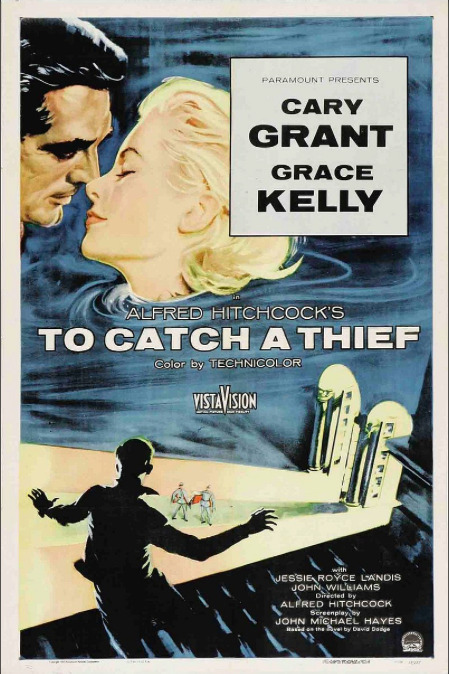
While the plot-beats and the atmosphere may differ heavily from North, the strange twists and turns of Grant and Grace Kelly's characters echo that of Grant and Saint’s roles in the aforementioned film, if perhaps in inverse. Grace Kelly brilliantly-- and a bit psychotically-- somersaults from the role of a mute wallflower, to a coy would-be detective and thrill-seeker, to that of a scorned-- if confused-- romantic throughout the runtime; finally settling as a willing participant to Carey Grant’s ex-cat burglar escapades. Grant’s character is anything but the everyman that he would go on to portray in North, while Kelly’s is far more complex-- and potentially much more unlikeable-- than her character in the then newly minted classic Rear Window.
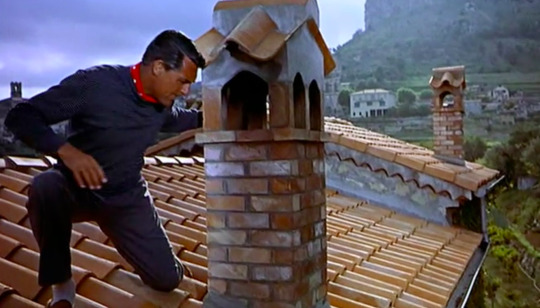
The coastal French Riviera is the setting for this reverse caper in which nothing is as it seems and everything is worth questioning. The script has aged a bit more roughly than other Hitchock masterworks, but the atmosphere-- well supplied by the natural beauty of the Riviera and the green-tint filter of Hitchcock’s nocturnal lens alike-- are a fantastic foundation on which Grant and Kelly flex their adroit acting chops. Grant-- here a still-lithe middle-aged career-criminal-- holds every card except that of Kelly’s heart, and that romantic tension alone sustains the pacing expertly.
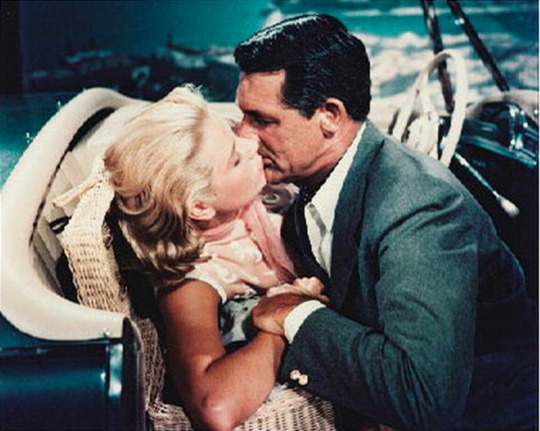
#4- The IPCRESS File (1965)- Tracking down a blu-ray for this early spy-thriller classic is tough but, hey, Michael Caine as the thinking-man’s Bond? Sign me up!
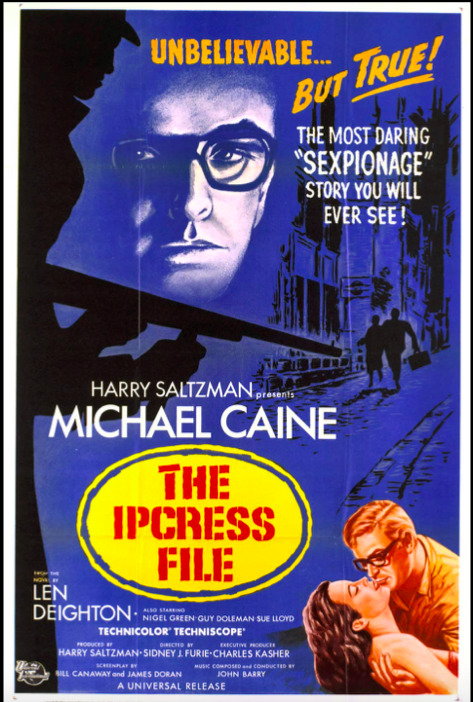
#5 From Russia with Love (1963)- Okay, okay, I give. I’ll give you freaks what you want. A taste of legitimate MI6 realness. This is the grade-A real deal, and it may not feature the stabilized quality-control of Roger Moore’s era or the unwieldy set-pieces of the Brosnan/Craig eras (or the darkness of Dalton’s stint) but it is the follow-up to the premiere of Bond as we know it, and its influence would ripple out for over half a century and counting.
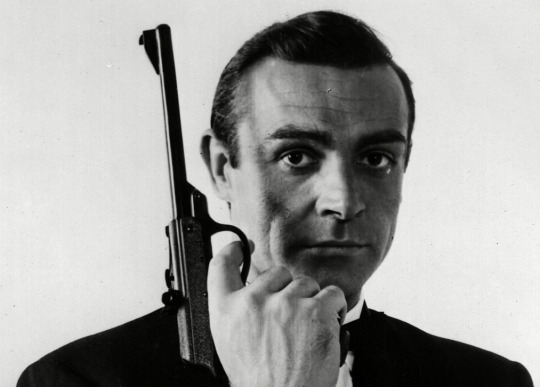
If the previous years’ Dr. No was a test-run, then Russia was proof-of-concept and more. Connery--now equipped with the toupeé he so quickly developed a need for between productions of his premiere as Bond and this--rises to the occasion and makes good on the promise of the first film and then some.

In this outing, we find a lot of ‘firsts’ for the long-lived series: the first gadgets, the first larger-than-life villains and the first-- if not long-lived in this case-- signature vehicles. While the Bentley Mark IV would soon be replaced, the other tropes start to take root. The first sequel in a decades-long series has a lot of responsibility to shoulder in terms of solidifying what aspects of the series will continue ad infinitum, after all, and From Russia largely does a fantastic job of it.

Daniela Bianchi-- an actor too Italian to not be dubbed reportedly-- does an excellent job as an early Bond-movie heroine with some depth, but is outshone largely by Kerim Bay, played by phenomenal Mexican actor Pedro Armendáriz.
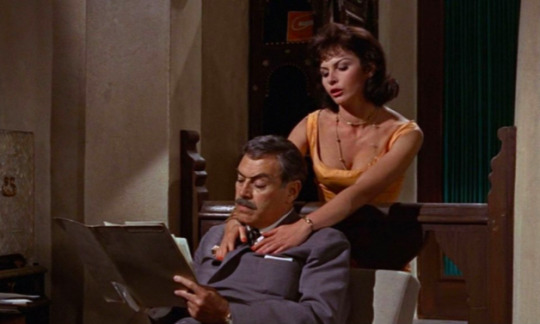
Armendáriz as a British consulate in Istanbul makes a fantastic second-fiddle to Connery’s Bond and fills shoes that often aren’t filled at all-- those of a proper side-kick’s, if not mentor’s that is. His role along with the equally show-stopping villain-de-juor Donald Grant, played by an incredibly menacing Robert Shaw, are the highlights here.

Indeed, his fight-scene with Connery in a train-car towards the end is one of the unique pinnacles of the film and sets high standard for future showdowns. Elsewhere, we find many of the highs that we’ve come to associate with the series at large: rollicking adventure, suave and shady dealings, tension abound et al. And also some of the lows: indeed, towards the middle we find a belly-dancing scene and a Romani cat-fighting scene in close succession which both exemplify the detached misogyny that often factors into much of early Bond. This, on some level, must be expected from the series I suppose-- a transgression readily accepted by actual 007 films yet not found in any of the progenitors that rank higher on my own list, alas.
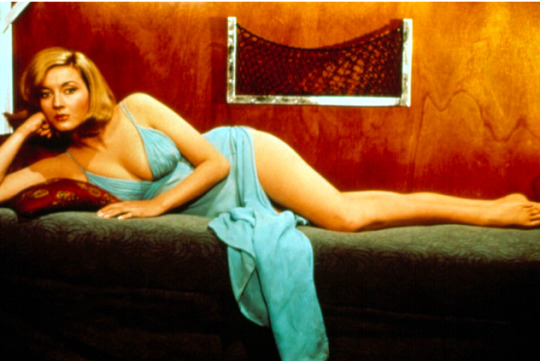
Following the fantastic fight-scene-- a culmination of shenanigans in Istanbul and Connery’s budding-yet-relunctant romance with Bianchi-- we have a North By Northwest homage, except with a helicopter in place of a cropduster, as well as the destruction of a sex-tape of Connery and Bianchi, and that's pretty much the movie! It’s almost a perfect Bond flick.
Runner-ups:
Goldfinger (1964)- Incredibly cast and acted villain, an extended golfing sequence and the debut of the iconic, tricked-out Aston Martin DB5 many would come to associate with the Connery-era films. Sure there’s a bit of rape, but it was the 60s! (so sorry)
[Also the original 'Casino Royale' (1967) and 'A Fish Called Wanda' (1988) almost made the list.]
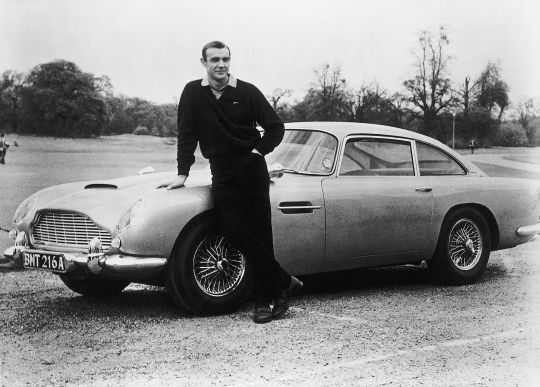
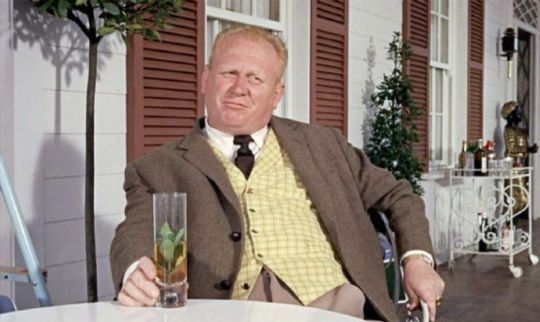
The man with the golden touch, indeed. Sorry for trolling so hard and.... Bond forever~
#bond#James bond#mi6#Ian fleming#Sean connery#carey grant#Audrey hepburn#ava marie saint#grace kelly#hitchcock#Alfred hitchcock#stanley donen#donen#to catch a thief#north by northwest#charade#from Russia with love#goldfinger#ipcress file#the ipcressfile#Michael caine#hollywood#classic film#golden age hollywood#golden age#film#film history
5 notes
·
View notes
Text
The Rona
Once upon a long year dreary, as I pondered weak and weary
over many a curiously crazy story of political lore
about the insanely fraudulent scheming, it felt like I was dreaming
that some crooked, reality show con-artist boor
had become the president of this American shore—
it had to be a dream, and nothing more.
Ah, unwitting and unwary, I remember it was February
and the freezing snows had not yet melted outdoors
when in quiet winter stillness we first heard of some strange illness,
some new viral illness spreading on a distant shore,
a novel corona virus infecting the distant Chinese shore—
and certainly not here, forevermore.
And the crazy quick outrageous spread of the disease contagious
thrilled me—filled me with fantastic terrors never felt before,
so that now, to still the racing of my mind I began pacing,
wondering if this foreign agent would come knocking on my door,
if this deadly, infectious agent would slither underneath my door—
and kill us all, and nothing more.
Not to mention, conclusions foregone, in the white house sat a moron,
(and if you are a Republican, your forgiveness I implore)
but intellectually, he was napping; and his hair was always flapping,
flapping in the wind that emitted from his mouth forevermore,
ignoring figures, facts and reality itself forevermore—
this is the truth, and nothing more.
Deep into this quandary peering, long I stood there, wondering, fearing,
doubting that this administration full of idiots galore
could possibly save us in case of crisis, from terrorists like ISIS
let alone a pandemic that threatened to spread to our shore,
for anything resembling reality they tended to ignore—
yet their loyal base continued to adore.
Back into my chamber turning, my feverish forehead burning,
little did I know the Rona had already crossed my door,
had entered our unwary nation by the thousands on vacation
flying into airports and entering unscreened by scores,
pouring into the population, spreading the virus galore—
unscathed we were, nevermore.
Open here I flung the shutter to get some air and loudly utter,
“What did you expect from a man who is a cretin at his core?”
who had left us drained and weary with his nutty conspiracy theories
of how the virus was a Chinese hoax and nothing more,
or a plan by democrats to make him look bad, or so he swore—
and dismissed it all, forevermore.
But the Rona stepped in anyway, ignoring him, and was here to stay,
for the cretin’s cartoonish, buffoonish tweets little relevancy bore,
for we cannot help agreeing, no living, stable, thinking being
ever saw a president quite so petty at his rotten core,
so pompous and tyrannical at his obviously shallow core—
who refused the truth forevermore.
And the Rona spread, beguiling all the victims who weren’t smiling,
circulating from mouth to mouth with every sniff and cough and snore,
and not the least exception made he, not a minute stopped or stayed he
but infected every lad and lady from Atlantic to Pacific shore,
and perched above the busts of Washington and Lincoln and more—
and conquered America forevermore.
Much I marveled at this insanely infectious bug that so plainly
cared not for political party, creed, class, race, location, or
whether or not you believe it existed, or how much you resisted,
a ghastly, grim, and virulent Rona from a distant Asian shore,
who could be stopped by simply wearing a mask inside the store—
but some would not forevermore.
So the scientists spread the word, and every rational person heard
that if you simply kept your distance and wore mask in the store
and every time you encountered folks, for this virus was no joke,
we could stamp it out like other plagues that had come before,
stop its communal spread within weeks and shut the door—
but some would not listen forevermore.
Startled by the ignorance broken by advice so aptly spoken
some idiots instead listened to their witless leader they adored,
attending maskless parties and rallies, and no one keeping tallies
of who was infecting whom, spreading the Rona around galore,
and hundreds of thousands perished from shore to anguished shore—
and the Rona continued forevermore.
And then it started spreading faster, and unmerciful disaster
dispersed across the entire land to nearly every single door,
until the hospitals were flooded, yet the Rona, so cold-blooded,
continued its march unimpeded like an invading force at war,
until one day there appeared a vaccine for which we did implore—
and the Rona was invincible nevermore.
Then, methought, the air grew lighter, for the vaccine was a fighter
ready to knock out the Rona and kick its ass across the floor,
Savior! I cried, hope has lent thee, by science God has sent thee
to save us from the relentless Rona that had conquered our shores,
but whose virulent ass the vaccine would kick out the door—
and eradicate forevermore.
Be that word our sign of parting, viral fiend! I screamed upstarting,
get thee back to thy dark, infectious hell-spawn shore,
leave no spore as a token of all the lives you have broken,
leave us alone and never again knock upon our nation’s door,
take your wheezing, feverish hands off our folks and find the door,
and get thee gone forevermore.
But the Rona, never quitting, still is sitting, still is sitting
on the minds and memories of all those affected from before,
and that time has all the seeming of a nightmare we were dreaming
and the aftereffect will forever throw its shadow on the floor,
and the soul of our nation from out that shadow
shall be lifted nevermore.
-G.J. Filip, 12/2020
2020 was the 175th anniversary of Poe’s ‘The Raven’
#poem#poetry#poe#poetrythreesixfive#georgefilip#spilledink#spilled words#poetsontumblr#PoetsofTumblr#poetryportal#poetsandwriters#edgarallanpoe#theraven#therona#coronavirus#pandemic#satire
8 notes
·
View notes
Text
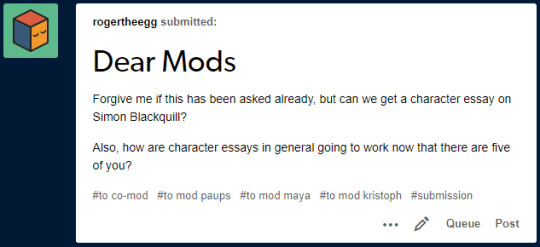
Dear rogertheegg,
As mentioned before, any of the Mods are free to write whatever they want about whoever they want, so there’s isn’t really an established system there.
And I don’t believe the Twisted Samurai has an essay just yet, so if you would, please join me in a moment of

Simon Blackquill, your unfriendly neighborhood convict-samurai-prosecutor combo. I can only imagine what the writers at Capcom were thinking of when they came up with him, but it wouldn’t surprise me if it went something like this:
Head Writer: “So, we’ve already had a corrupted childhood friend, a ruthless perfectionist, his whip-happy daughter, and a smooth-talking coffee lover for a prosecutor. How can we top that?”
Writer 2: “What about a samurai?”
Head Writer: “A samurai prosecutor? That doesn’t sound very believable.”
Writer 3: “What if he’s also a psychology expert, and he knows how to manipulate others’ emotions?”
Head Writer: “That sounds even more far-fetched.”
Writer 4: “What if he’s a convicted criminal?”
Head Writer: “PERFECT!!”
After doing some research on his wiki page, I discovered that the contradiction of his being both a criminal and a prosecutor was part of his design from the very beginning. Whether this sort of thing could happen in real life, it makes for a very intriguing concept -- someone who is paying a (supposed) debt to society while at the same time attempting to collect that debt from others of his kind. Or in his words...

Like many of the prosecutors Phoenix and the gang have faced in the past -- scratch that, like all of them -- Simon Blackquill’s story is shrouded in mystery. For all we know, he could be guilty as charged of a heinous murder -- and a very violent one, as indicated in his opening cutscene.
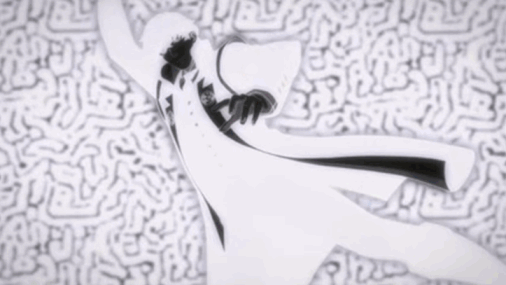
Nonetheless, the Chief Prosecutor (whom we later learn to be a familiar face) has no qualms about letting him prosecute as long as he’s kept under surveillance. Despite being less than trustworthy, even taking pleasure in scaring those around him, he has an undeniable talent for forcing the truth out of criminals. As an expert in psychology, he’s mastered the ability to use emotions to his advantage.
Say...is it just me, or does that sound like someone else?
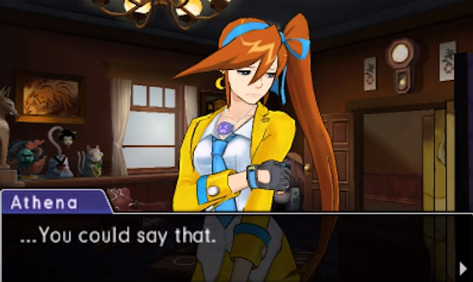
Before seeing him face-to-face, we’re informed by one Bobby Fulbright that his conviction was the main catalyst for the Dark Age of the Law. He sounds like the last person anyone would expect to serve as prosecutor, but on top of that, he and Athena have some form of connection between them. I don’t know about you, but that had me raising my eyebrows.
And then we get to see how he operates in court.
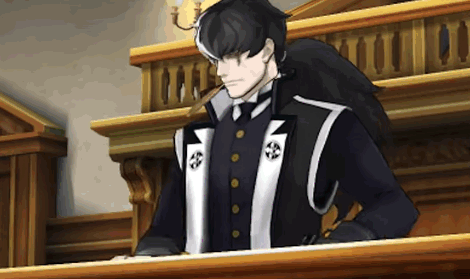
Like any other Ace Attorney prosecutor, he refuses to let court proceedings go any way except his way. Rather than using a forceful or intimidating attitude, however, his weapon of choice is the power of suggestion, which he clearly knows how to use well. In a matter of seconds, he’s able to convince the judge to do his opening statement for him, all while poking fun at his age and lack of hair (not that it’s very difficult to sway this particular judge).
One part I love about his introduction is how much more intense the air becomes when we find out his shackles aren’t made of titanium, as Apollo was hoping.
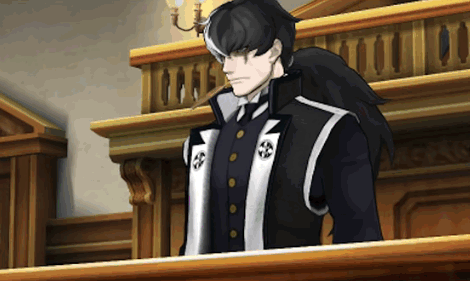
I honestly started fearing for Apollo’s life for a moment the first time I saw this. Luckily, the only harm Simon meant to do was psychological.
So far he’s pretty much par the course as far as prosecutors go, outside of being an inmate and a psych expert. The only thing he’s missing is some form of physical abuse.
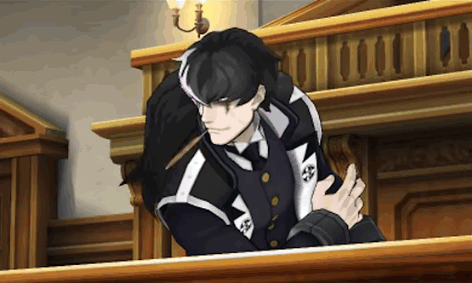
Whoops. Spoke too soon.
And that’s just the beginning. On top of his “Simon Says” games and samurai speak, he uses his fellow and former inmates as examples for his arguments, making for some interesting (if disturbing) tales of the clink. Speaking of...
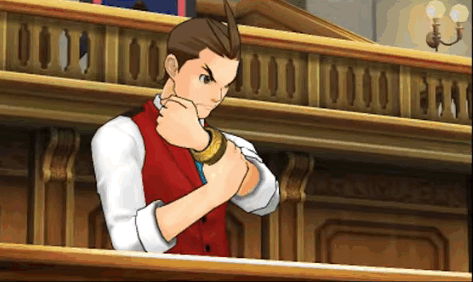
His feathered companion has a way of showing up out of nowhere, adding yet another layer to his intimidating nature. Besides providing another pair of glaring eyes from the prosecutor’s bench, Taka acts as Simon’s “henchman” of sorts -- distracting the defense, grabbing evidence for him, and even holding documents as he reads them. Once again, I have to give those writers credit for making him the most sinister ambiance possible. Even Jinxie thinks he’s a “Leader of the One Hundred Demons.”
On that note, the most satisfying part of a courtroom battle against this fiendish prosecutor is seeing his defeat.
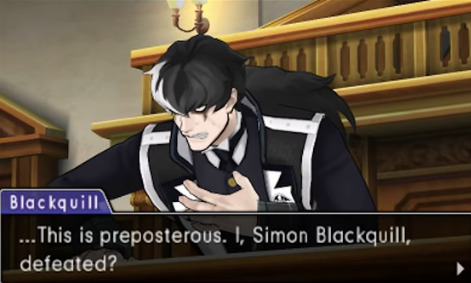
It’s almost like beating a final boss in an action/adventure game. In fact, I’d say it’s exactly like that in some ways.
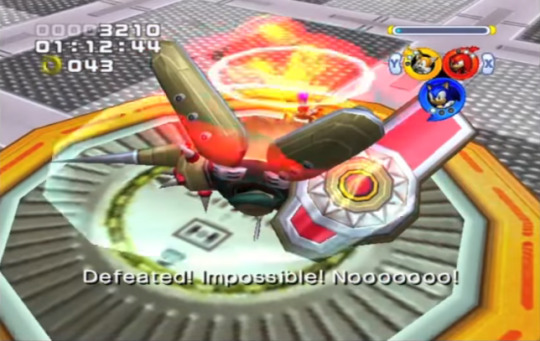
After defeating him three times in court, we still know very little about him, until our “good” detective friend lets us in on something he heard him say:

Being his shadowy, secretive self, Blackquill refuses to say anything on this subject when Phoenix brings it up. It isn’t until Athena becomes a murder suspect, his desperate sister takes a number of hostages, and he’s finally called to the witness stand and given an Athena-style therapy session that his tight lips begin to pry open:
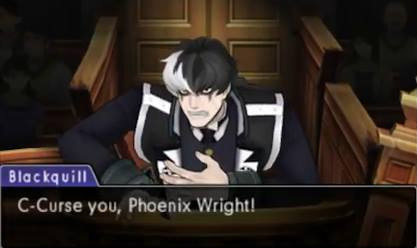
To the surprise of many -- the judge, his sister, the courtroom, and -- most importantly -- the player, he spills his guts on what truly happened the day his mentor was murdered. In other words, it could be said that Phoenix gets someone to “confess” to their innocence for once. And it’s this very reluctance -- a reluctance to tell a truth that would literally set him free -- that sets him apart from every other antagonist (perhaps even every other character) in the series. What could drive someone to confess to a crime they didn’t commit, remain a prisoner for seven years, and be willing to face execution?
After the case surrounding him, Metis, Athena, and the Phantom is brought to an end, he finally gives an answer to that question:
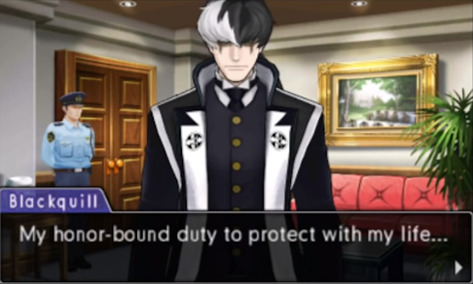
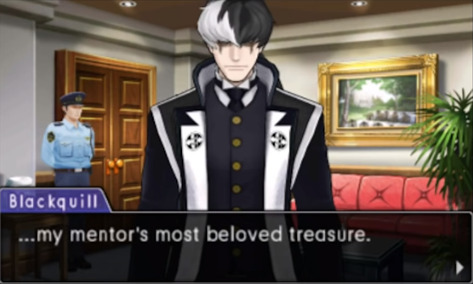
What seemed like sheer stubbornness up until now turns about to be the loyalty of a samurai. While this doesn’t quite excuse his brash attitude, his violent tactics in court, and his morbid jokes, it does help you see him less like a villain and more like a hero in disguise (or an antihero, at the very least). Like his sister, his actions were questionable at best, but his heart was in the right place, just as Athena suspected all along.
One other thing I enjoyed about his character development was how it ended up being the mirror opposite of “Fool Bright’s” development. The buffoonish detective who seemed to have a Gumshoe-esque loyalty to Blackquill ended up being one of the cruelest and most uncaring villains in the whole series. It wasn’t until Phoenix unmasked him that he and Blackquill flip-flopped their roles as protagonist and antagonist. The irony in this series never fails to satisfy, does it?
We only get to see the Twisted Samurai for a single case in the next game, where he has the same harsh-but-caring personality that made him so memorable before. While his faith in Athena isn’t as strong as you would think (considering she helped save his life and all), it’s clear that he still sees a lot of undeveloped potential in her as an attorney, and even offers to help bring it out...in his own special way.
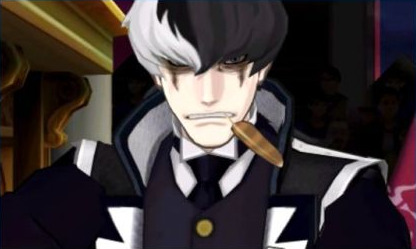
As that lovely image becomes ingrained in your mind, I’d like to conclude by saying that Simon is living proof that appearances can be deceiving. Much like the Phantom (and a certain green ogre), he has a number of layers to his personality; some are pleasant and some are unnerving, but like his mentor and her daughter, he’s all heart.
-The Co-Mod
46 notes
·
View notes
Text
How To Intimidate A Writer
TITLE OF STORY: How To Intimidate A Writer
CHAPTER NUMBER/TITLE/ONE SHOT: Part 27
AUTHOR: winterheart17
WHICH TOM/CHARACTER: Loki
STORY GENRE: Romance, Drama, Erotica
STORY SUMMARY: I think we can all just agree this has turned into a proper series even though it started off as a compilation of one shots for my story ‘How To Love A Writer’! What happens when a struggling virginal historical romance writer and the God of Mischief are thrown together, locked in a mansion and agree to a game of love and seduction?
STORY RATING: M
STORY WARNINGS/TRIGGERS/AUTHORS NOTES: None for this!
FEEDBACK/COMMENTS: Whew, sorry for the long break! I initially wanted to make this chapter longer - but as I was writing it, it kinda took a life of its own and I figured the part I had in mine (after where this one ends) would be better as another chapter. That’s the one I’m hoping all of you will feel proud of Little Writer! Until then, consider this as a build-up for an interesting chapter ahead (sorry, I know this chapter isn’t super jam-packed with things happening, but trust in the process! This build-up was needed). Feedback would be wonderful and ever inspiring for writing updates! <3 Do let me know if anyone would like to be on or of the tag list.
Tagging @devikafernando @ureyesonly21 @nuggsmum @queen-sands @ihatespoilers @say-my-name-assbut @hsvbabe @jrubalcaba @dandelionlady96 @ashleyloveslots @kiera-auroraborealis @alexakeyloveloki @damageditem @lokilvrr @cuteandnerdythings @everythingeverywherelistening @wildest-dreams-at-midnight @tfwqueenidjit @xxxprettydeadgirlxxx @noplacelikehome77 @vertdragain @jessiejunebug @toaster-strudel-witch @a7xlizardqueen @starscreamloki @tinchentitri @prettyjewel93 @chantimoondancer @dangertoozmanykids101 @winterisakiller @humbleslvt
Masterpost of How To Love A Writer
Alternate link to Masterpost of How To Love A Writer (in case the above doesn’t work)
Well, fuck.
My fingers ran across the tines of the three forks placed to my left as I sat there, having ruminated for the past ten minutes, trying my best to recall if proper dining etiquette dictated I started with the utensils going outwards in, or vice versa.
Did they even adhere to the dining etiquette we had on Earth?
The placement of their utensils certainly alluded to so.
And the last thing I wanted to do was to give them any cause to mock me or look at me with their downturned snobbish expressions.
How typical of a Midgardian.
I could already taste the disdain that would roll so easily and loosely off their tongues if the shifty and really, not-very-subtle gazes from various Asgardians seated at the long table – stretched from one end of the hall to the other – were anything to go by.
I winced, shifting in my seat. The high back of the chair was hard and stiff – made from pure gold, I was certain, what with the flamboyant theatrics the entire Hall was decked out in tonight.
It appeared… this King Ehrendil was someone to be impressed.
Though why, was absolutely beyond me as the minutes continued ticking away and he was nowhere to be seen.
If there was anything I detested, it was someone else who would take someone else’s time for granted – as if he or she had more important things to attend to instead of keeping an appointment. And judging from the amount of people seated at the table – I don’t think I did particularly well in Math in highschool, but I’d be damned if there weren’t at least 30 of us waiting with bated breath.
10 minutes? I could deal. Half an hour?
What was he doing?
Counting every single strand of eyebrow hair for his subjects to fawn over?
Well, it was no wonder his daughter turned out to be such a piece of work, whom, might I not-so-snidely note wasn’t present at the table either.
My eyes flickered to the figure sat across me and I berated myself for feeling my heart shrivel a little further with deflated hope as he sat there as he had for the past half hour – jaw locked in stoic silence with his eyes trained in every direction except the one where I would interrupt his line of vision.
What had I been expecting?
“I think I love you.”
My heart beat furiously in my chest – like a little hummingbird, drained and exhausted, but refused to be silenced.
Even when his arms around me tensed.
Even when I manoeuvred myself, tilting my head upwards only to see his jaw harden and his eyes sewn shut.
Even when my heart thudded dully in my chest – the little claws of doubt sinking into it – all flesh and blood as the thrumming grew louder and louder in my ears as seconds ticked past, melding into minutes.
Say anything.
I wanted to shout.
Wanted to scream.
Wanted to yell and shake him alive until my throat was raw and the colour of crimson red that splattered my insides.
Suddenly, all went quiet.
Silent.
And in that little space between the soft and even expelling of his breath and the loosening of his grip around me, I found my answer.
It was painful and it was damn near impossible to face, but it was the truth.
Rejection resided there.
Existed and grew tenfold until it filled every nook and cranny in my body – crushing my lungs.
Wheezing.
I gasped.
I couldn’t help it – couldn’t quite find an outlet for the stab that quietened into an ache that spread across my body, twisting and turning in my veins.
And still… still I could not bring myself to regret the words.
Even though I knew they were a mistake.
Even though I felt him pull further away than he had ever had before – placing brick after brick between the both of us to erect that infinite barrier he was walling himself into.
Even though a voice inside of me screamed that I had just single-handedly destroyed all that I had worked so hard towards.
And what was that?
A voice echoed in my head.
Just what had I been working so hard towards that I had sacrificed everything that should have mattered to me: the truth, my dignity, my heart.
To keep him by your side, you silly little girl.
And my throat began to close up – could feel the threatening prick of tears in my eyes.
The words had come out so effortlessly, so bravely… I’d be damned if I allowed myself to be shamed for them.
My fingers dug into his skin, unconsciously – leaving behind little red crescent marks.
He cleared his throat.
“I think we should sleep now.”
“You start with the outermost fork,” a gruff voice jolted me out of my painful recollection of the previous night’s happenings.
Of course, we hadn’t had a chance to since then speak.
When first light broke out across the sky, I had turned after a fitful night of sleep only to find his side of the bed cold, empty, and wanting. I couldn’t quite remember how long I had laid there, curled up in a ball, waiting for the tears to come.
Except they didn’t.
Not this time.
There was no sobbing and no theatrics, just numbness that chained my limbs and kept my eyes to the ceiling for hours on end until I dragged myself out of bed.
My head whipped to the right, in search of the owner’s voice.
And I found myself staring straight into a pair of familiar blue eyes.
“Thor!” the single syllable slipped out, carrying surprise.
Both seats that flanked me had been vacant prior to me spacing out – nobody had deigned to sit next to the lowly Midgardian, it appeared. Even if it was close to their King who sat at the head of the table next to Queen Frigga. There were two opposing empty seats right next to them and I could only deduce that they were reserved for the royal asses – literally and figuratively.
He gave me an impish grin and a wink.
“Ah, just as I suspected, the Pompous Prick has yet to make an appearance. It was just as well I had slipped into the Royal Kitchens for some sustenance given his predilection for tardiness,” he quipped, before giving his taut belly a light but firm pat.
My eyes widened.
“The Pompous Prick?” I reiterated, slowly and carefully just to ensure I hadn’t misheard.
Unless they associated another sort of meaning with ‘pompous’ and ‘prick’ here on Asgard.
He raised a brow, before leaning in with slight tilt of his chin in agreement.
I followed suit.
“He’s a difficult to take a liking to being who thinks everyone is beneath him. Only Father would deem him worthy of such prestige. You have met his offspring, I presume?” he continued and I almost chocked.
Offspring.
He uttered the word with enough of a shudder and a tinge of revulsion, I couldn’t help but feel a kick of smugness in knowing I wasn’t the only one at the table who saw through her fake ass bullshit.
“Halwen?” I asked in hushed tones.
He wrinkled his nose.
“I take it you don’t like her?” I prodded.
He let out a derisive snort.
“If she had something to take a liking to in the first place,” he threw back.
“Oh, thank God,” I breathed, the prayer slipping out mindlessly and he raised a brow, quizzically.
“Which one?” he asked, and I had to stifle the urge not to burst out laughing like a maniacal woman.
Between torturing myself with unrequited feelings for a man who clearly derived satisfaction from using me and the outlandishly charming but buffoonish naivety of his brother – I could slowly feel my sanity slip out of my grip. Perhaps if I acted mad enough, they’d lock me away in their equivalent of an asylum.
“I’m just relieved you aren’t out to kiss both their asses like the rest of the goons here,” I explained in haste.
His eyes widened immediately for a fraction of a second, before his features contorted in absolute disgust as he shook his head, violently.
“Is this customary of you Midgardians? Twice now you have referenced what I may only imagine as a gesture and fascination Midgardians may have regarding… that area of… anatomy,” he forced out, making another face at what I could only imagine as garish imagery in his head.
If I hadn’t felt like choking then – I certainly felt like it now.
“That is not what it means!” I sputtered, straddling the line between exasperation and laughing.
He held up his hands as if in defence.
“While it may not be a tradition us Asgardians observe, far be it for me to pass judgement on the cultural exchanges of other beings,” he said in a non-committal response.
That earned him a thwack on his shoulder.
Which frankly, probably did my hand more harm than it did him.
“You didn’t tell me you were Thor, his brother,” I hissed.
He paused for a moment, looking genuinely flummoxed as to what I was referring to before a grin broke out wide across his face.
“Ah… that…” he muttered beneath his breath.
My eyes widened and I jabbed my finger into his forearm.
“Don’t you ah, that me. You knew exactly who I was and kept your identity a secret that night,” I admonished.
At least he had the decency to look sheepish as he ruffled his hair in an apologetic manner.
Almost.
“I thought it best lest you should mention to him of our encounter…” he started, his voice trailing off as his hand gestured as if expecting me to fill in the blanks.
I leaned closer, shaking my head at him – because if he was throwing a bone at me, I definitely wasn’t catching it.
He cleared his throat.
“Perhaps you have yet to notice, but my… brother doesn’t take too kindly to anything that involves my name. In fact, I am perhaps inviting his wrath just from my proximity to you right now,” he continued.
I glared at him still.
He winced, resting his hand on the back of his neck – his expression one reminiscent that of a guilty puppy and I felt my consternation budge.
God damn it.
I blew him a raspberry, throwing my hands in the air as I shrugged.
“Fine. I’ll let you off the hook this time. But in case you haven’t noticed, your brother and I… aren’t exactly on speaking terms at the moment. I hardly think he’d be bothered where I am concerned,” I hissed, trying to quieten the ringing truth I heard behind the words.
He paused, a brow slightly raised – disbelief clouding his eyes.
“I find that rather… difficult to believe,” he murmured, slowly.
And there it was – that little prick in my chest that had me torn between wanting to believe in the conviction he had in me and wanting to scream at his misguided trust.
My eyes narrowed on him.
“Oh, believe me. I wish it wasn—,” I started to say, but he cut me off.
“He hasn’t taken his eyes off you since the second I sat down,” he muttered his breath, so quickly and softly, it stunned me for a second.
“Wh—what?” I stuttered.
He met my gaze – his pupils sliding ever so subtly to the figure seated opposite us.
“He hasn’t taken his eyes off you since I sat down next to you,” he repeated, a little more solemnly this time.
My lips parted, eyes hazy and unfocused as I instinctively began to turn my head – as if his mere presence was the centre of my gravity – until Thor grabbed my forearm, firmly.
“Don’t look,” he bit out, snapping me back to reality.
He leaned in closer – so close I could feel his body heat emanating from his clothes as he blocked out whatever peripheral vision I had to whisper into my ear.
“There we go,” he mumbled and I didn’t even have to look at him to hear the smile in his voice.
“What?” I queried, not quite exactly sure what was going on.
“If I know my brother, and I believe I know him well – he should be roiling in his seat,” he continued, his words tinged with the low rumble of a chuckle.
Why?
Why bother?
The self-sympathetic question dancing on the tip of my tongue.
I wanted to tell Thor that it didn’t matter – that I had torn out my heart and given it to him, but he didn’t want it anyway.
But instead, I cleared my throat.
“Why are you doing this?” I asked, a lump lodged in the middle of my chest as he began to pull back, slowly.
Our eyes met and his twinkled.
“Because… sometimes… anger is needed to realise what is important in front of you,” he answered with a wink.
And in that very moment, I’d be lying if I said I didn’t feel the warmth that bloomed in my chest, trickling into my veins.
How different these two brothers were – day and night.
I leaned back a little, studying the gruff figure in front of me – noticing the way his hair shone and glinted in the warmth of the light as his skin glowed golden.
The Golden boy.
How different he looked in comparison to skin that came alive under the pale silvery light of the moon with hair the shade that disappeared into the night.
I felt a twinge.
But before I could part my lips to utter a reply, the doors to the Great Hall were flung open, the creaking and groaning filled the space – taking over the low thrumming din that had been background noise as it dimmed into nothing but pin drop electrically-charged silence.
“Here we go,” Thor sighed, that denoted the next few minutes of my life weren’t going to be exactly pleasant, before he pushed his seat back slowly to stand in honour.
The sound of chair legs scraping against the floor multiplied – echoing across the Hall as I followed suit, my eyes resting momentarily on Loki.
If he had been, as Thor had described, staring at us with venomously the entire time – he certainly wasn’t now.
His face was turned firmly away from me to his right and I followed his line of vision.
King Ehrendil.
Dressed in robes that called to mind the midnight sky laden with the twinkling of a million stars, I could only make out his profile as he strode past the entire length of his table – flanked left and right by guards with Halwen following close on his heels.
He was tall – that much I could make of and commanded a regal presence.
When he finally stopped about three seats away from us as he bowed his head ever so slightly as a gesture of respect towards Odin – in a manner that denoted he knew he was arrogantly that of higher ranking – I had to blink thrice to ensure the vision of the man in front of me was real.
His hair was that of starlight, long and straight that ended at his waist – his of that from another world with its soft and ethereal luminosity. A stark comparison to Halwen who seemed to gleam with the light from the sun.
“Asgard welcomes you, King Ehrendil,” Odin greeted with a bow himself.
I hadn’t even realised it was as if someone had hit the pause button on this entire scenario – I had barely even noticed how still everyone had become until both King Ehrendil and Halwen took their respective seats and it was almost as if every single individual let out a collective breath of relief, before the sound of chair legs scraping the floor resonated in the air once more as everyone settled back down.
“Thor,” I heard the sickeningly saccharine voice carry over to me as she sat down next to my only friend at the table… hell… in all of Asgard.
I didn’t have to turn to imagine the forced smile plastered across his face – could hear the reluctance in his voice as he returned her greeting.
“It has been far too long,” she remarked as I decided to return my concentration to the cutlery in front of me.
Keep my head low.
That was the game plan.
And not to speak unless absolutely required to or addressed.
Quite frankly, I swallowed, as I snuck another glance at the figure across the table who had started leaning in towards his left – his entire body tense and alert as he tried to make bits and pieces of the conversation between Odin and Ehrendil – the only thing that was weighing on my mind was the dreaded confrontation I knew was coming after all this was over.
I couldn’t…
I couldn’t keep living like this.
In limbo and in shame.
I tried to steady myself even as my hands began to shake at the very thought – if he didn’t want me, I would leave.
“Not nearly long enough,” I heard Thor mutter beneath his breath and it was difficult to stifle my smile.
“How have you been?” another question came and I wondered why in the world was she trying so very hard to win over someone who was clearly making his distaste for her evident.
Perhaps she was the sort who needed the adulation and adoration from everyone.
“Fairly well… until a few moments ago,” he answered, hesitating as he drew out the last few words so slowly, there was no mistaking the meaning behind those words.
There was a pregnant pause.
The tension palpable in the air and I only thanked the stars that he sat there separating the both of us.
“I see you’ve not lost much of your charm over time,” came the jab upon realisation that there was no need for such niceties.
“If only the same could have been said of you,” he jabbed right back.
A little bubble of mirth burst from my lips – I couldn’t help it. A reply as snide as that deserved a reaction.
It didn’t miss her ears and I only hoped to whatever higher power that was up there that it would grate further on her nerves.
“If I were you… I’d be showing a lot more respect to someone who may soon be a part of your family,” she growled.
Wow.
This woman took delusional to another level.
He let out a little snort.
“Well, then it is with much fortune – mine not yours – that you are not me, nor I am you,” he retorted and it took me all my willpower not to give this God a medal.
I could have sworn I heard a choking sound – perhaps the eek of her internal struggle of descending into incandescent rage and the awareness of not being able to blow her top off right there and then in front of so many.
I heard her clear her throat again, an underlying hitch that denoted a sense of purpose – a signal of sorts.
And from my peripheral vision, I saw King Ehrendil pause – filling my stomach with dread as the chatter between him and Odin slowly died down.
I knew what was coming next.
And with the rest of the Hall’s chatter coming to a halt as the atmosphere began to climb electrically once more – it appeared that everyone else knew too.
“I believe an explanation on the breaking of the betrothal is required?” he queried.
God damn, even the man’s voice was out of this world – smooth and silky, caressing every nerve in my body as I froze, eyes still glued to the cutlery in front of me.
Don’t look up. Don’t look up.
It was quickly becoming clear that this would be my mantra for the night.
Prickly, uncomfortable silence spread across the Hall and I could only imagine the exchanging of awkward and concerned glances all around me.
“King Ehrendil, perhaps this conversation would be better suited in the priva—,” I recognised the timbre in Queen Frigga’s voice – a salve meant to soothe the thorny words and lingering hostility.
But he was having none of it.
A first thumped the table – the move reverberating throughout the Great Hall – causing my plate and cutlery to rattle. I jumped in my seat – almost jumping out of my skin at the unexpected display of anger.
“With all due respect, Queen Frigga…” his words meted out, cold and stony – even her name sounded derogatory coming from him.
“… this betrothal had been meant to be the unification between our worlds. Should the discussion of the breaking of it then not include both worlds? Or has years of peace lulled you into a false sense of impression that Alfheim would take such humiliation quietly?” he snapped.
Well, clearly, this was someone who got his way frequently.
“You misunderstand us, King Ehrendil,” Odin jumped in.
I snuck a glance up quickly at his face and there was no mistaking the displeasure he was openly displaying for the world to see. He arched a sardonic brow.
“A misunderstanding,” he repeated, slowly – rolling the words off his tongue, mockingly.
Quiet rage simmered beneath the surface – as if one tiny spark would be enough to set him off on a course of war.
“And was it a misunderstanding when Halwen delivered the news to me – the breaking of the betrothal… a treaty years in the making – instigated by your son, Loki, with no other explanation other than a… Midgardian girl is involved?” he growled, another fist to the table.
Well, shit.
Right.
My heart thumped in my chest.
That’s my cue to look down.
Look down.
He turned his head, slowly.
Look the fuck down.
But it was too late.
Starlit eyes locked onto mine.
#htlaw#how to love a writer#lokixreader#lokixoc#loki fanfiction#loki fanfic#loki fic#loki#how to intimidate a writer#tom hiddleston#hiddles#hiddlestoner#jealous loki
208 notes
·
View notes
Text
THE HAM TREE
1906 - 1907 / 1915
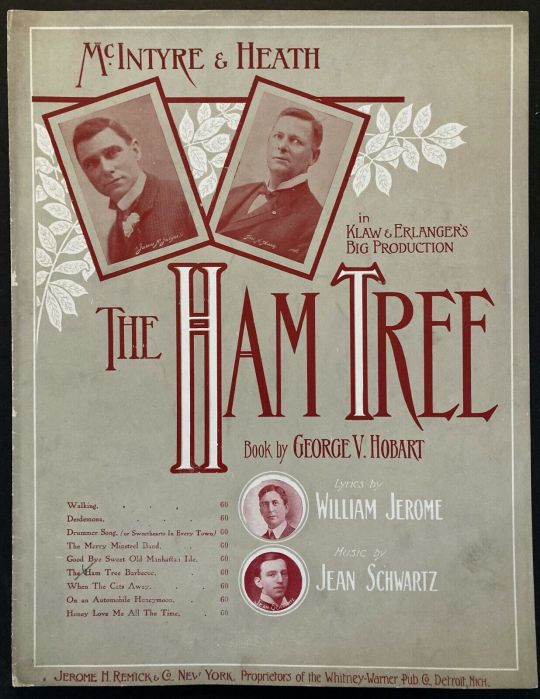
The Ham Tree is a musical in three acts by Jean Schwartz with Lyrics by William Jerome, and book by George V. Hobart. It was originally produced by Klaw & Erlanger and staged by Herbert Gresham, musical staging by William Jerome, starring McIntyre & Heath and featuring W.C. Fields.
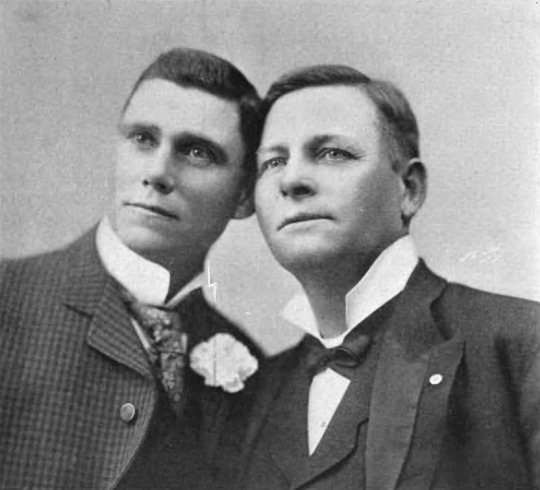
James McIntyre (1857-1937) and Thomas Kurton Heath (1853-1838) were white minstrel performers, vaudevillians, and actors. In 1874, they created a blackface tramp comedy duo act that became world famous. McIntyre played Alexander Hambletonian, a buffoonish stable boy, and Heath played Henry Jones, an entertainer who frequently outwits Alexander.

William Claude Duckenfield aka W.C. Fields (1880-1946) was a clown, juggler, and frequent Atlantic City performer, making his Broadway debut in The Ham Tree as Sherlock Baffles, a role written for him to incorporate his juggling skills. He went on to great success in films.
The play is based on a McIntyre & Heath skit also called The Ham Tree, which involved the two characters discussing how ham grows on trees 300 feet tall.
The musical takes place in North Carolina, Delaware, and New York City. In it, Hambeltonian and Jones are stranded in a small town and pass themselves off as a rajah and his minister to get free room and board.
In the months leading up to the Broadway production, McIntyre & Heath had begun incorporating a condensed version of the The Ham Tree into performances of other material as sort of a preview. They advertised their farewell to vaudeville. The musical began rehearsals on July 3, 1905 at the New Amsterdam Theatre in NYC.
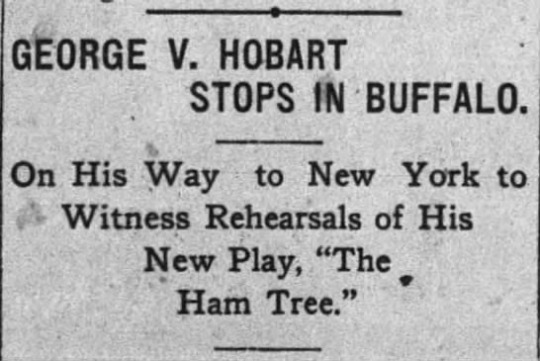
"I think Buffalo will like it. I know they will like Mclntyre and Heath, and Klaw & Erlanger are to put on the production in a manner that will be found marvelously beautiful." ~ GEORGE V. HOBART

The Ham Tree premiered in Rochester NY, at the Lyceum - “the only first class theatre in the city!” From there, it was replanted in Buffalo NY on August 21, 1905.

The Ham Tree opened on Broadway at the New York Theatre (1514-16 Broadway at 44th Street) on August 28, 1905.
About the Venue: The New York Theatre opened as the Olympia Musical Hall, part of a three-theatre complex, in 1895. It was renamed the New York in 1899, and, except for a brief stint at the Moulin Rouge, remained so until 1915, when it became a movie theatre.
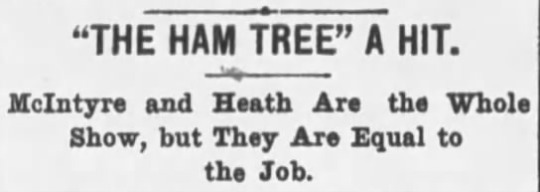
“Of course, there is no plot to 'The Ham Tree’. How could there be with that name? But no one misses it. The chorus has some new stunts such as gathering on the footlights and calling the bald heads to them with open arms. The ‘heads’ were perfectly willing to come, and even carry the suitcases which figure in one of the scenes.” ~ NEW YORK TRIBUNE
“’The Ham Tree’ is strong variety meat. It Is flavored with the burnt cork comedy that gained its performers popularity when Long Acre Square was little more than a wilderness and it is served with a vealy chorus dressing supposed to appeal to up-to-date appetites.” ~ NY EVENING WORLD
“The applause in its behalf was more noisy than convincing. McIntyre and Heath repeated three times their act, with slight and inconsequential variations. Each scene ended with a chorus, one of which is entitled to commendation. Among the members of the troupe is W.C. Fields of whose juggling too little was seen.” ~ CHICAGO TRIBUNE
The musical closed on Broadway on November 11, 1905 after 90 performances and went on the road.

On July 23, 1906, it arrived in Atlantic City NJ and played the Savoy Theatre on the Boardwalk. McIntyre, Heath, and Fields were still with the company. After this stint at the shore, the play returned to Broadway and the New York Theatre for the month of August 1906. The return engagement lasted 40 performances, shuttering on September 1st. But that was not the last of The Ham Tree.
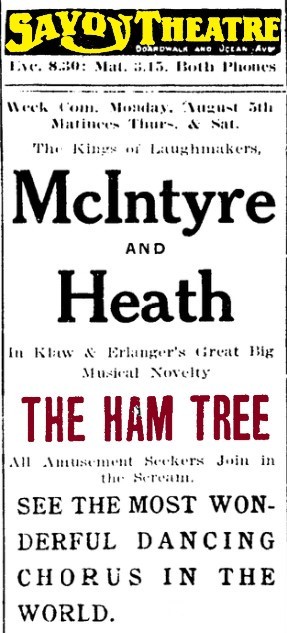
The musical returned to touring, and arrived back at the Savoy in Atlantic City on August 5, 1907. Headliners McIntyre & Heath were still on the bill.

On May 24, 1915, Atlantic City saw a revival of the play with the original stars. Again it was back at the Savoy, only now it was named The Cort and managed by impresario John Cort. This was the opening performances of the newly-named Cort. The play clearly was indelibly associated with McIntyre and Heath, who once again headlined. W.C. Fields, however, was then on Broadway as part of The Ziegfeld Follies of 1915 aka The Blue Follies. Coincidentally, the Follies tried out in Atlantic City’s old stomping grounds, Atlantic City. Fields left AC with Z just two weeks before The Ham Tree arrived. While McIntyre & Heath were still corking up, Ziegfeld bravely featured a real man of color - the extraordinarily talented Bert Williams. But that’s another blog.
#The Ham Tree#McIntyre & Heath#Klaw & Erlanger#Atlantic City#Broadway Musical#blackface#W.C. Fields#Cort Theatre#Savoy Theatre#New York Theatre#George V. Hobart#William Jerome#Jean Schwartz#1905#1915
1 note
·
View note
Text
For some reason, Tumblr does not want me to reblog your post (x) with my added thoughts, @flslp87. When I tried to do it just now, it did all kinds of weird things with formatting, so I decided to just put my answer to your question in a separate post. Why is Tumblr the way it is, lol?
Oh the Wish Realm! How to explain the Wish Realm when it seems the writers can’t even make up their mind what the “rules” for it are. Here’s my thought, and it’s based just on my reading of the WR episodes in season 6 and what we’ve seen in season 7; it’s just my speculation of what A&E intended and I could be totally wrong.
1. The wish realm was originally only supposed to be a 2 episode thing. A&E planned for it to be basically a manifestation of the EQ’s wish. Because of that, several of the characters were significantly different from who they are in the real world. Hook, for example, was an old, fat buffoon. Emma was a naïve princess who seemed afraid of her own shadow, etc. I don’t think they ever intended this to be a true “if the curse had never been cast” au.
2. If Jen had taken the showrunners up on their offer to come back for season 7, my guess is that the writers wouldn’t have visited the wish realm. Emma and Hook would both be cursed in Hyperion Heights, and we’d get another “first meeting/falling in love” between them (although they would probably be more like Snowing season 1—aka, not really the focus, but an important subplot). I don’t know what would have happened with regard to Alice. Maybe she’d be the CS child. Maybe she’d be a child Hook didn’t know he’d fathered previous to meeting Emma. Maybe she wouldn’t be related to him at all.
3. When Jen declined to come back, I think the writers wanted to find a way to keep Colin around without jeopardizing the CS happy beginning. There was really no good way to do that if OG Hook was around in season 7 but Emma wasn’t, so they turned to their ready made solution—the wish realm. If we had a version of Hook who wasn’t original Hook, then we could have the best of both worlds, so to speak. But this meant that they had to kind of change the rules of the Wish Realm. It was no longer just a “fake” manifestation of the EQ’s wish, it became a real place with real au versions of the characters. Emma was the one exception. She was really just Emma “cursed” to be a caricature of herself that the EQ created.
I think you’re right, @flslp87 that the two Hooks’ paths forked at the moment of the curse. When the EQ made her wish, that forking of the paths happened. OG Hook kept his same life and experience, but Wish Hook shows what Hook could have become if the curse had never been cast.
I’m not sure how much of the season you’ve watched, but I don’t really see Wish Hook as behaving differently than OG Hook would have in the same situation. I don’t think he’s stupider than regular Hook. We honestly haven’t seen him much in the EF—at least not on his own. Both versions of Hook were hellbent on revenge—until they found something that they were willing to give up their revenge for—love. In the case of original Hook, that was for Emma (and for a chance to be a part of something, beyond just her). For Wish Hook it was love for his daughter.
Hook ended up at the tower in the first place, because he was looking for something that would let him trap Rumple and get rid of his magic, so the quest was still very much revenge related. When he got there, he found what appeared to be a beautiful damsel in distress. He offered to help her, because he was always a man of honor—when it didn’t conflict with his vengeance, and going back to set Rapunzel free didn’t. We, of course, know what came of that, and when Gothel was ready to callously abandon her newborn daughter, Hook couldn’t do it. He knew what it was like to be abandoned by a father and he was not about to do it to his own flesh and blood—no matter how repugnant the mother’s actions were in conceiving that child.
So most of the time we see Wish Hook in the EF, it’s Hook post redemption event. (I say “redemption event” because I think that was the moment he chose to change, just as him returning with the bean in 2x22 was OG Hook’s “redemption event”. He still had the journey to take, but that was the moment he started back on the right path.) He was the equivalent of post 3a OG Hook. So no, he didn’t have revenge on his mind anymore. His new focus is, and has continued to be, finding a way to get rid of the curse on his heart.
Speaking of the curse on his heart…I think it explains how he came to become the old, fat, buffoonish version we saw in season 6. He continued trying to get near Alice, and every time he did, his heart became more corrupted. He also gradually lost hope in finding a solution and began wallowing in self pity. When he met Emma in the Wish Realm, his purpose was renewed. He decided that True Love might be the solution to his problem. If another version of himself could find true love with Emma, why couldn’t he find an Emma of his own, share TLK, and be cured of his heart curse? So he sobered up and went back to his task with his characteristic intensity.
Now Rogers…I think he can be compared to Deckhand Hook in some ways, but not in others. I think they’re similar in the fact that they’re largely straight-laced. They follow the rules as much as they can. Rogers, however, has the same courage and single-minded determination of either OG Hook or Wish Hook. He doesn’t have any of deckhand Hook’s timidity. When he makes up his mind to do something, he’s going to do it come hell or high water.
You mentioned not following actors or being interested in them, by which I think you mean you think a lot of season 7 Hook fans continued on mainly because of an interest in Colin. I can’t speak for others, of course, but for me that’s not precisely true. I am a fan of Colin, of course, but I’ve continued to be invested in season 7 because of the character of Wish Hook/Rogers, how he’s so similar to OG Hook, but is different in a way too because of the way circumstances in his life are different. I’m also invested in his relationship with his daughter. It’s a different TL story than what we have with CS, obviously, but the parent/child dynamic shows a whole different side of Hook, one that we got glimpses of when he was with Henry or young Neal, but one that wasn’t fully fleshed out until season 7. I know you’re not a fan of Alice or Knightrook, so this is something you probably wouldn’t find compelling, but to me, this relationship has much more depth than merely the writers trying to give fan service to Hook fans who wanted to see him with a baby.
Anyway, I don’t know if that totally answered your question, but there are my thoughts on Hook in season 7.
23 notes
·
View notes
Photo

Lee Marvin was wounded in battle during World War II. A few movies by other actors who saw combat.
Jimmy Stewart in It’s a Wonderful Life. D: Frank Capra (1946). Stewart was an Army pilot during WWII and flew dozens of dangerous missions inside enemy lines. At least once he took enemy fire and his plane cracked open when he landed at base. He was eventually grounded with what we now know as PTSD. He spends a good part of the Capra movie, his first since returning, playing a man falling apart, alternately enraged and depressed and ultimately suicidal. Once you see it you can’t unsee it.
Mel Blazing Saddles. D: Mel Brooks (1974). Sure he played a burlesque-skit Governor, but he also wrote the scene where Slim Pickens railroad boss needs to send horses to check for quicksand and says “We can’t afford to lose any horses you dummy! Send over a couple of n-----s! I wonder if he was thinking of his service in the Army Corps of Engineers when his duties included defusing land mines ahead of the troops.
Jason Robards in All the President’s Men. D: Alan Pakula (1976). As a Navy radioman, Robards had one ship (USS Northampton) torpedoed and another (USS Nashville) was hit by a kamikaze plane two years later. So when his Ben Bradlee says “Nothing’s riding on this except the first amendment to the Constitution, freedom of the press, and maybe the future of the country,” nobody can doubt his authority to say those words.
James Doohan in Star Trek II: The Wrath of Khan. D: Nicholas Meyer (1982). Doohan was a lieutenant in the Royal Canadian Artillery when he hit beach Juno on D-Day. He shot two snipers and led his men through a minefield before being hit by six rounds of friendly fire. (In classic movie fashion, a cigarette case kept him from getting one in the chest). So in ST2 when he shows up on the deck with a dead crewman in his arms and says “He stayed at his post when the trainees ran!”, his experience might have been one of the reasons the scene wasn’t melodramatically silly.
Charles Durning in To Be Or Not to Be. D: Alan Johnson (1983). Durning landed on Omaha Beach on D-Day, was captured in the Battle of the Bulge and was one of only three survivors of a massacre of American POWs at Malmedy, Belgium. He got his second Oscar nomination for playing a buffoonish S.S. Colonel. Revenge is best served with a substantial paycheck.
0 notes